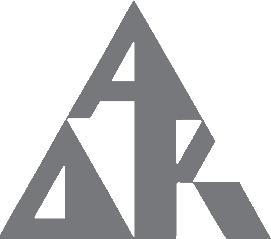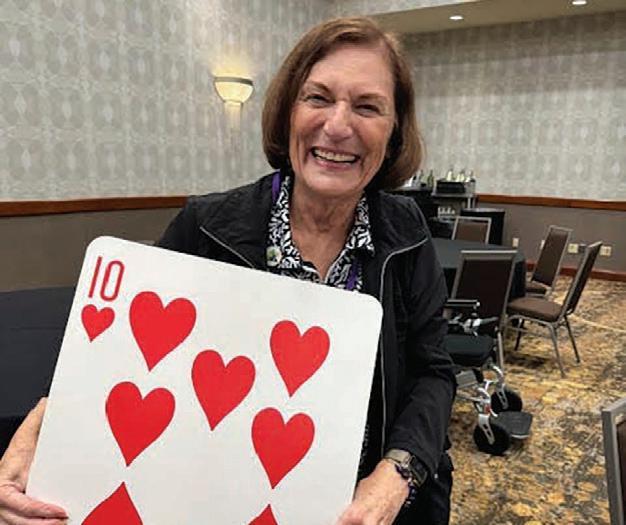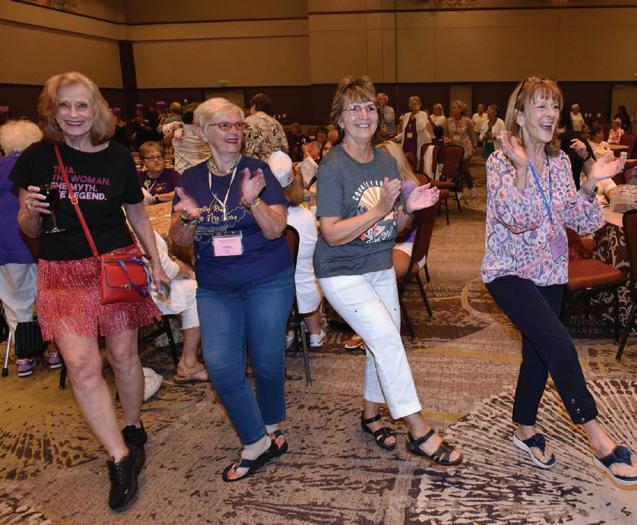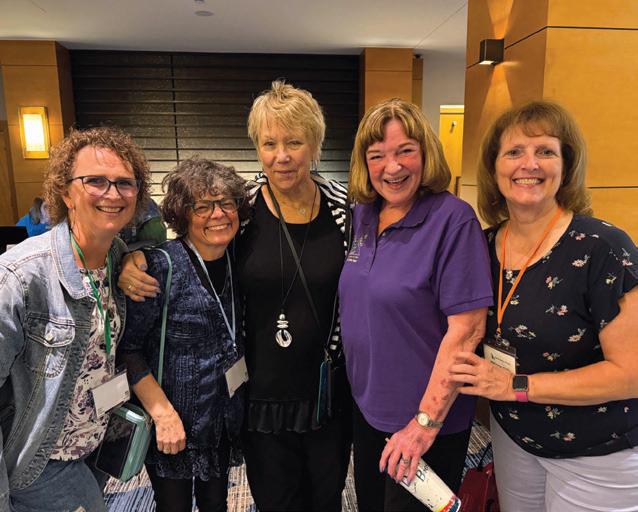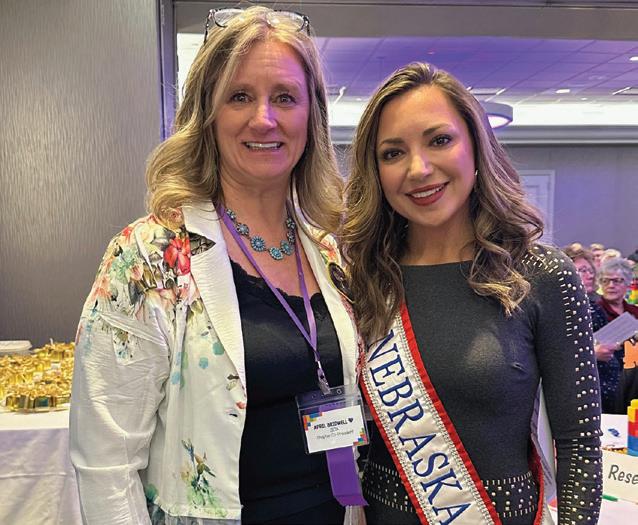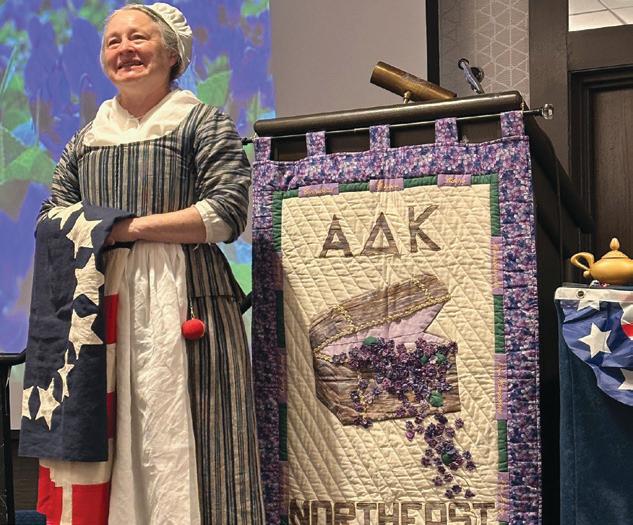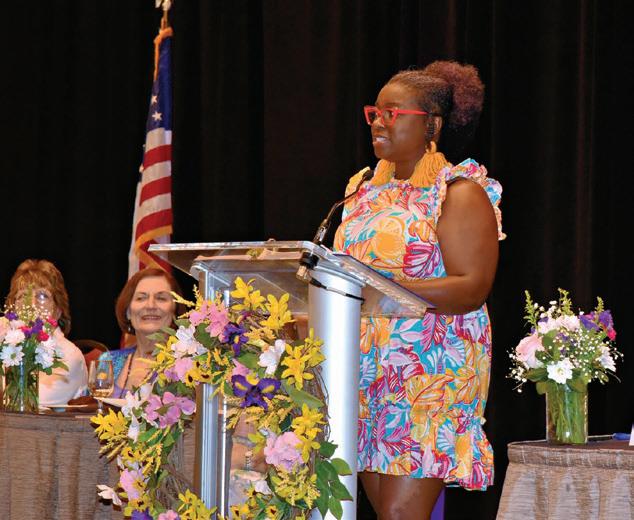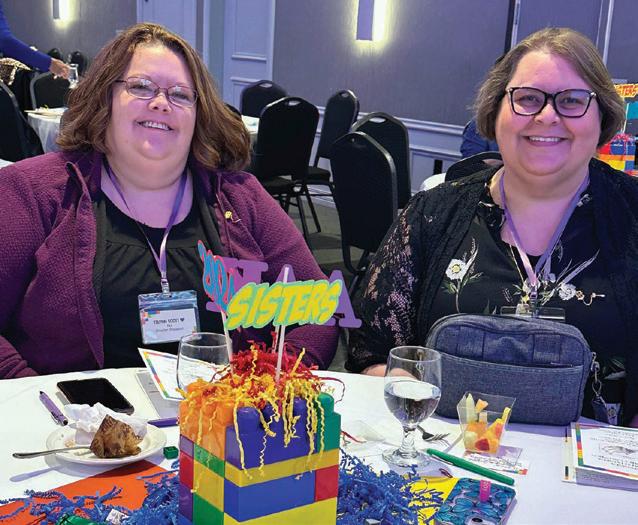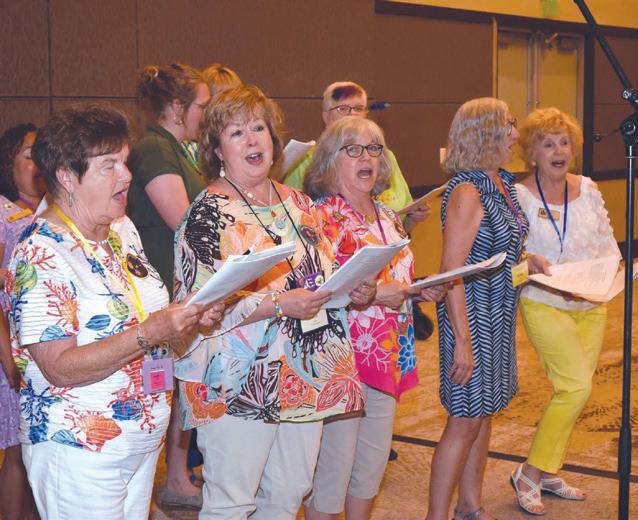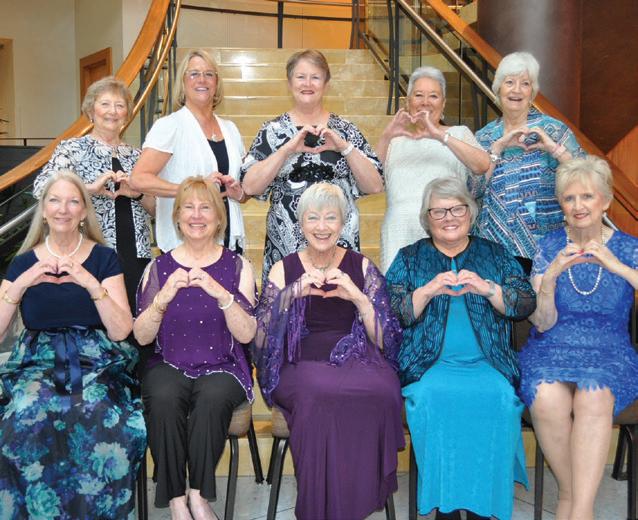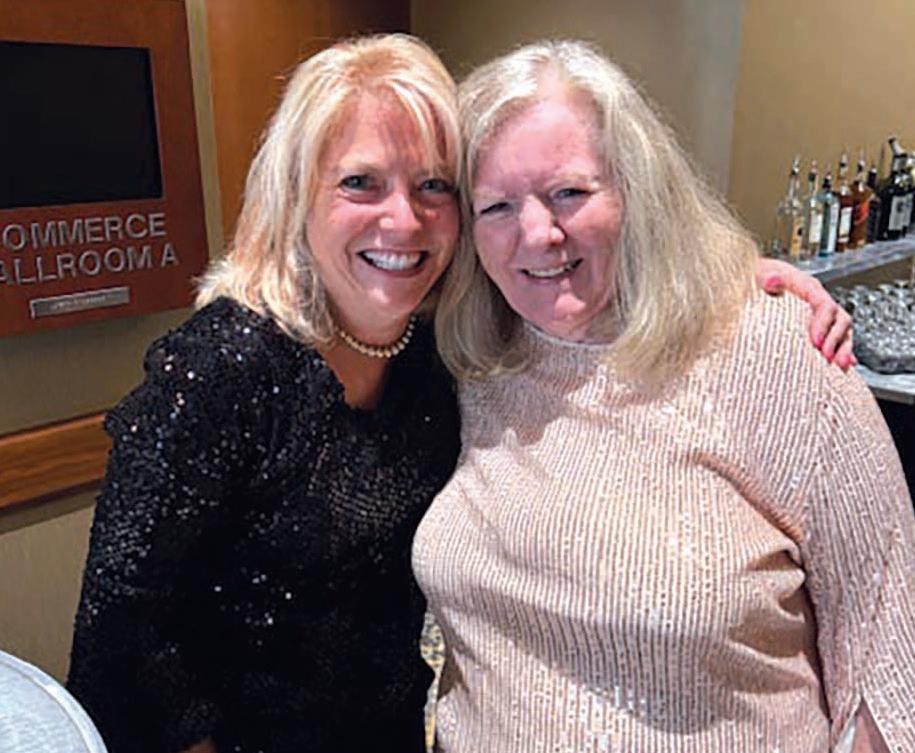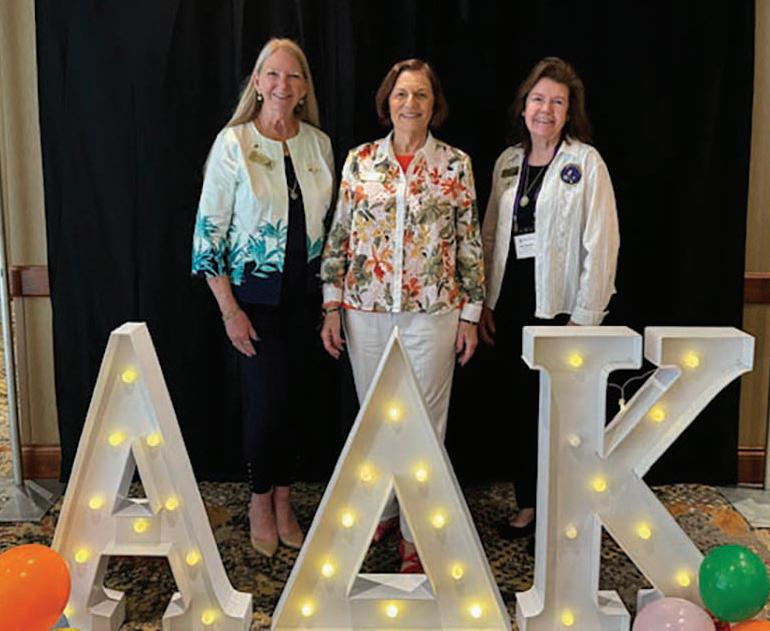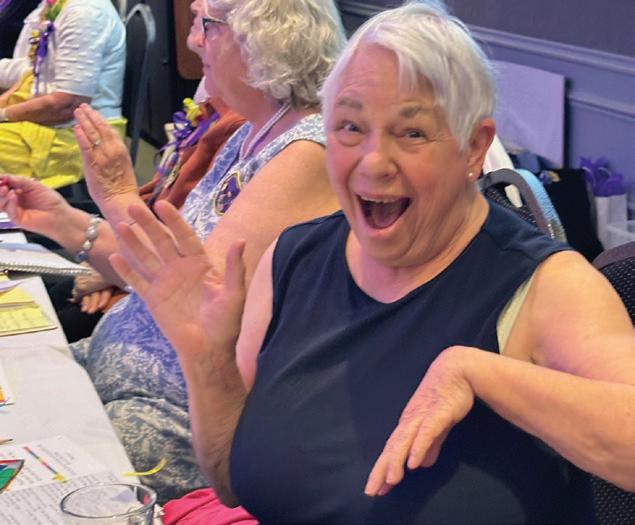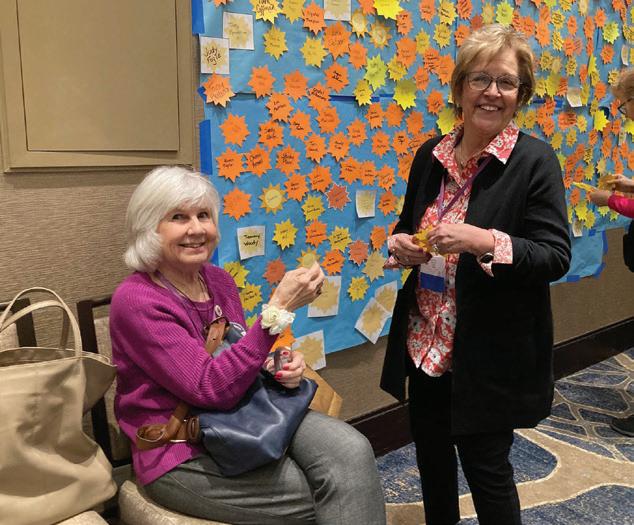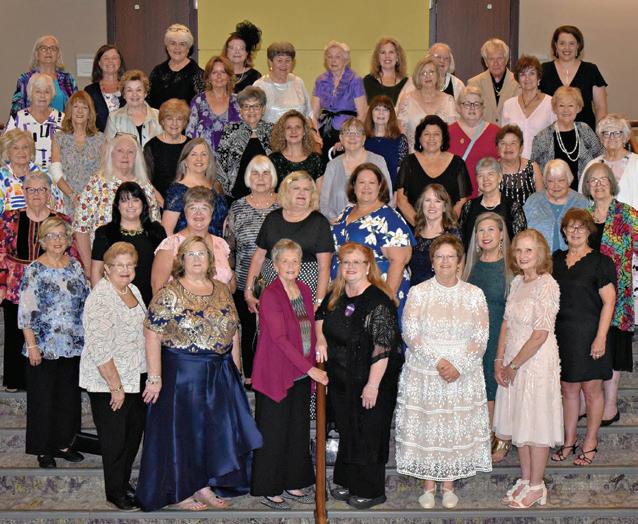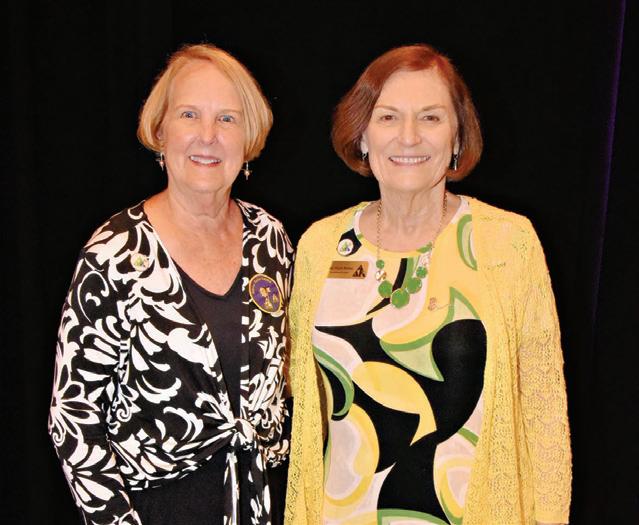

SEPTEMBER

BRIDGE TO CHANGE
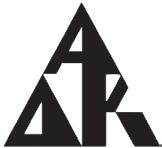





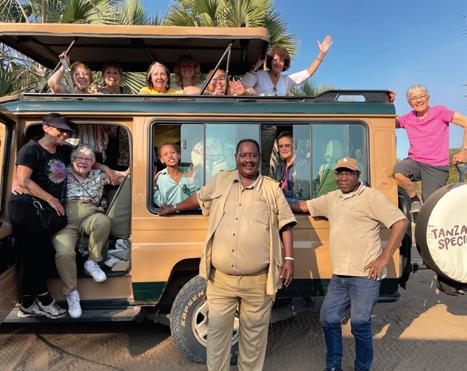

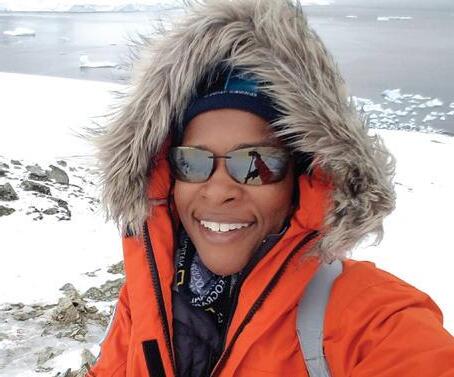
Foundation of Trust and Inspiration
4 Shared Leadership Model Coming to Headquarters
5 IEB to Make Changes in Regional Conferences
5 Puerto Rico A∆K
6 Anything Which They May Ask of Me
7 Report on Project C.H.E.A.R.
8 Summary Report of the Ad Hoc Committee on Voting 10 DEI: What it is and What it Means for Alpha Delta Kappa
Freedom is an Open Book
Championing “Critical Literacy” to Cultivate and Celebrate an Equitable World
KAPPAN EDITOR
Joanne Grimm, CA Alpha Alpha
KAPPAN TEAM
Susan Pelchat, CT Mu
Shannon Lorenzo-Rivero, TN Chi
Betty Sherrod, VA Gamma Omicron
Susan Whelan, NJ Kappa
Julie Kinder-McMillan, TN Alpha Gamma
Gwen Steele, NE Kappa
Daniel LaBorde, Digital Communications Coordinator, Int'l HQ
KAPPAN EDITORIAL BOARD
Ann Marie Brown, International President
Conway Blankenship, International President-Elect
Mollie Acosta, Immediate Past International President
Christi Smith, Executive Director
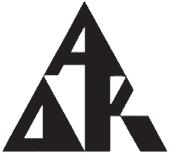
Alpha Delta Kappa empowers women educators to advance inclusion, educational excellence, altruism and world understanding.
The KAPPAN magazine is published quarterly by Alpha Delta Kappa, International Honorary Organization for Women Educators. Find the KAPPAN Publishing Guidelines online at www.alphadeltakappa.org.
Alpha Delta Kappa International Headquarters: 1615 W. 92nd St., Kansas City, MO 64114-3210 (816) 363-5525, (800) 247-2311, Fax (816) 363-4010
email: headquarters@alphadeltakappa.org www.alphadeltakappa.org
The opinions expressed herein are those of the individual authors and are not necessarily in conformity with those of Alpha Delta Kappa or the editor.
Bridging Hearts: A Gallery of Our Members' Adorable Pets
Exploring the Resources of the A∆K Website
Looking at the Position of Sergeant-at-Arms
Doing the Teacher-Mom Balancing Act
Looking for Founders’ Day Ideas? Look No Further 22 Four Generations Enjoy Membership
KAPPAN Congratulates
Collegiate Clubs
Altruism
#A∆K
Omega Chapter
The Omega Service Honors, Remembers 33 A∆K Calendar
33 Together We Fight Alzheimer’s Disease
“Autumn shows how beautiful it is to let things go.”
The deadline for submissions to the December 2024 issue is October 1, 2024.
Share stories of your chapter’s winter activities with KAPPAN readers. How does your chapter keep active during the cold weather? Please provide identification of members in photographs. Please include your name, chapter, state, province or nation, your office, and a way we can reach you if there are questions or more information needed.
To submit articles/photos, go to the A∆K website >About>Publications> Submit to the KAPPAN. Follow submission guidelines on the submission form.
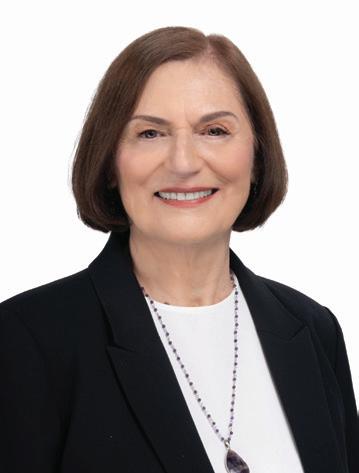
Happy New Year. No, I am not confused. "September," according to author Gretchen Rubin, "is the other January."
Or, as another author, F. Scott Fitzgerald, said, “Life starts all over again when it gets crisp in the fall.”
As educators, we know that summer passes in the blink of an eye, and we are back again, decorating bulletin boards, organizing roll books, and looking for new ways to make lessons come alive. “This year,” we tell ourselves, “we will be organized.” This year, we will smile more than we will frown. This year, we will practice patience. This year, we will change.
The name September comes from the Latin septem, meaning seven. In the early calendar, September was the seventh month and the hottest time of year. When July and August were added to the calendar, September was bumped into the ninth position and now included the date of the autumnal equinox. Moving September changed our seasons. Literacy Day, established by UNESCO in 1962, is on September 8. The first U.S. newspaper was published on September 25, 1650. Labor Day was first celebrated in September 1888, and the Bill of Rights was added to the U.S. Constitution in September 1789. September is also a very popular birth month. September may be the harvest month, but it is also a month that we see the world around us change. September is the month that promises us we have things to look forward to.
In our A∆K world, September fulfills that promise. Chapters, Regions, States, Provinces and Nations have new leaders and new chances to tell their stories through their activities and achievements. The conventions and conferences held this spring and summer provided opportunities for sisters to share ideas
and learn new approaches to old problems. Now as our activities begin anew, is the time to put them into action. Changes have been made in the selection of the World Understanding Project, in voting procedures, and in the location of information on the International website. More changes will come with the uniting of Regional conferences and the opportunity for members to present at the International Convention general sessions.
Remember that so very old joke; change is inevitable except from a vending machine.
Nothing can be changed without causing disruption. That’s an indisputable fact. Albert Einstein said, “Insanity is doing the same thing over and over and expecting different results.” To keep Alpha Delta Kappa growing, we need different results. It’s time to stop saying, “But we have always done that,” and “If it ain’t broke, don’t fix it.” Consider sharing an altruistic project with another chapter. Ask members to share their talents, knowledge and passions. Don’t just think outside the box. Fold up that box and recycle it. Let’s take a note from Winston Churchill who said, “To improve is to change; to be perfect is to change often.”
While I’m quoting, here’s another one from Albert Einstein, and I think it’s one to live by. “Imagination is more important than knowledge. Knowledge is limited. Imagination encircles the world.” Go with your imagination. Imagine what you and your sisters can do, and don’t get stuck in the past. Change moves us forward.
Autumn, it is said, with its changing leaves and its approach to the cold of winter, shows how beautiful it is to let go. Let’s take a lesson from this season and let go of old ideas, old approaches, old attitudes and make this season the time for a fresh start. Let’s greet change with open minds and open arms.
Best wishes for a wonderful new year.

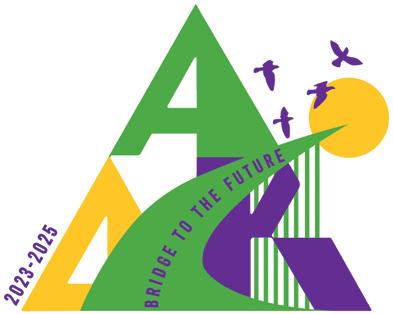
Good evening, esteemed members and guests of Alpha Delta Kappa. Standing before you tonight as we conclude this regional conference is an honor. Over the past few days, we have shared insights, built connections, and strengthened our commitment to the values that make Alpha Delta Kappa a beacon of sisterhood, altruism, and excellence in education.
First, I would like to express my heartfelt gratitude to everyone who made this event possible. From the organizing committee to the speakers, volunteers, and each attendee, your dedication and effort have been inspiring.
We have had an enriching experience filled with enlightening sessions, thought-provoking discussions, and meaningful interactions. We delved into diverse topics, from innovative teaching strategies to the importance of mental health and well-being in our schools and personal lives. Each session has contributed to our professional and personal growth, reminding us why we chose this worthy profession.
Our organization is not just regional or national but international, spanning all fifty states, two provinces, and three nations, making up the 55 states, provinces and nations, or S/P/Ns. From the bustling cities and countryside of the United States to the serene landscapes of Manitoba and Ontario, Canada, from the vibrant cultures of Mexico to the rich heritage of Puerto Rico, and across the sea to Jamaica, Alpha Delta Kappa unites educators from diverse backgrounds and regions.

South Central and Gulf regions. We have four regions that only have states comprising the region. Let us all make our provinces and nations feel more included by using the S/P/N designation that makes Alpha Delta Kappa an international organization.
Let’s take a moment to celebrate the achievements of our members across the seven regions. Whether receiving prestigious awards, launching successful projects, or making a difference in your communities, your accomplishments embody the spirit of Alpha Delta Kappa. You inspire us to strive for excellence and positively impact our communities and students’ lives.
As we look to the future, let us carry forward the knowledge and inspiration we have gained here. Education is constantly evolving, and so must we. Let us embrace innovation, foster collaboration, and continue to advocate for the well-being and success of our organization.
I encourage you to take what you have learned here and employ it in your schools and communities. Share your experiences, mentor your colleagues, and remain steadfast in your commitment to education. Together, we have the power to create a brighter future for our students and our society.
Thank you again for your active participation and unwavering dedication. Alpha Delta Kappa continues to thrive and make a difference through your efforts as we “Bridge to the Future.” Let us leave here with renewed energy and a shared vision for the future of our organization.
Th is international presence enriches our perspectives and broadens our understanding, strengthening our organization. I was able to experience the international perspective fi rsthand as I traveled as an ambassador for Alpha Delta Kappa, attending the national and provincial conventions this season with the Regional Presidents from the North Central,
Remember, as educators, we hold the key to unlocking the potential of the next generation. Let us use this power wisely and with compassion. Thank you, and I look forward to seeing the incredible impact you will make in the year ahead. Safe travels, and may we meet again at the 2025 International Convention with even more success stories and inspiration.


By International Vice President for Membership Kathy Beatty
Late summer and early fall bring a time of excitement and wonder as students and educators anxiously await a new school year. As educators, we look forward to meeting new students, reflecting on the last school year and considering how we might tweak some of our practices. Retired educators still get excited for the new school year and that feeling of starting anew. A new school year is a chance to transform how we do things and to renew our passion for the work we do each day.
The fall also is a time for Alpha Delta Kappa chapters to renew acquaintances with sisters, as well as a time to reflect and transform practices. Fall is a prime opportunity to give our chapters a boost of energy with the beginning of a new year as we invite prospective members to become sisters. This summer, chapters reflected on the past year, considered what to tweak and what to keep, finalized their calendar for the year, and crafted their chapter goals for the Chapter Needs Assessment (CNA) for the biennium. Many chapters choose to increase membership as their membership goal. This fall is the perfect time to begin working towards that goal. As we start this school year, consider inviting educators that you want to introduce to Alpha Delta Kappa to your chapter meetings and social events. Chapters often wait to invite prospective members because they feel the beginning of the school year is too busy for them. Reframe that thinking to say that the beginning of the school year is the best time to invite current educators to Alpha Delta Kappa. If you invite them at the beginning of the year, those educators can then feel the support and sisterhood that comes from being a member of your chapter throughout the entire school year. Now, more than ever, our current educators need a community of support who can help them through all the busy times of the school year, be there to listen to them and offer to help them in their schools and classrooms. If there are recent retirees that you are considering inviting to a chapter meeting, the fall is a good time to do that before they get involved in other activities. They also have connections to educators still working and so will be a great resource for future prospective members.
A benefit to initiating new members in the fall is the change
in the dues structure implemented by the International Executive Board (IEB) this past spring. The dues for new members who register after September 1, 2024, will be paid through December 2025. New initiates essentially receive up to four months free. There is no need to wait until January or later to initiate new members to get a break on paying dues. Reach out to prospective members in the fall and initiate them so they can reap the benefits of being a member of Alpha Delta Kappa throughout the school year.
Another change implemented by IEB is that the reinstatement fee is now zero, meaning no extra dues need to be paid for reinstatement. Each fall, our chapters experience new energy as sisters reconnect, look forward to a new year together, and get ready to celebrate Alpha Delta Kappa Month in October. Invite former members to your meetings in the fall so they can feel the excitement and energy of the beginning of the chapter year.
As you look to gain new members or reinstate former members, keep the relationship-building techniques in mind. We want to take time to get to know each prospective member and why she is interested in becoming a member. Provide opportunities for sisters to ask reflective questions and listen to what the prospective sister is looking for in Alpha Delta Kappa. Keep that focus as you invite her to meetings and events to help her see that she will get out of Alpha Delta Kappa what she wants. The resources from the Educators are Heroes grant training provide techniques and resources as you connect with prospective members, and they are available to all sisters. You can find those on the website > Members Only > Resource Library > Chapter Officers tab > Chapter Training Tools column > Educators are Heroes folder. As your chapter initiates or reinstates new members, keep the Onboarding of New Members process in mind. Assign those new members a mentor who will build a relationship with the new sister and who will help integrate her into your chapter.
New and reinstated members help transform and renew our chapter by bringing new energy, ideas, and excitement. We want to capitalize on that energy and invite them into membership right away. This fall is the perfect time to start—don’t wait!
“Embrace the beauty of autumn, for it is a season of transformation and renewal.”
By Christi Smith, A∆K Executive Director
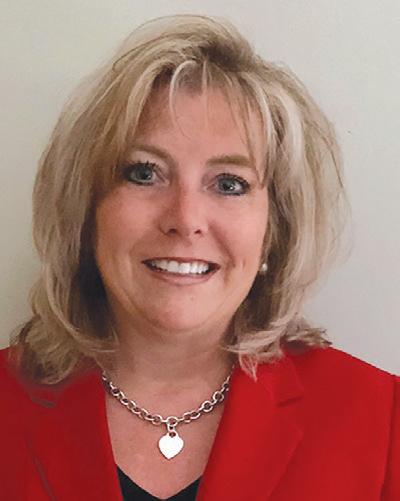
We are in the changing seasons. We change tee shirts for sweaters, campsites for classrooms and potato salad for potato soup. This is the time to put what was learned in conferences, workshops and idea exchanges into action. This is a time for change.
In today’s fast-paced and interconnected world, building a foundation of trust and inspiration is paramount. Whether you’re leading a team or managing a classroom, fostering a culture of trust and inspiration can significantly impact the team’s success. As educators, you understand that building trust in the classroom is essential for creating a positive and productive learning environment. When students trust their teacher and each other, they feel safe, valued and more willing to engage in the learning process. The same is true for leaders. Members want to belong to a chapter where they feel valued, encouraged and respected.
Trust is the cornerstone of any successful relationship. It creates a safe environment where individuals feel valued and respected. When trust is present, people are more likely to share ideas and engage in open and honest communication. To build trust, leaders must demonstrate integrity, reliability, and transparency. By consistently aligning words with actions, leaders can cultivate an atmosphere of trust that permeates the entire organization.
Inspiration fuels passion and motivation, driving individuals to achieve their best. Inspirational leaders have the ability to connect with their team on a deeper level, understanding their aspirations and strengths. By sharing a compelling vision and leading by example, leaders can ignite a sense of purpose and commitment.
Inspiration is not about grand gestures but rather about recognizing and celebrating the unique contributions of each team member, fostering a culture of appreciation and encouragement.
Active listening is a crucial skill that goes beyond hearing words. It involves fully engaging with the speaker, understanding their message, and responding thoughtfully. When leaders practice active listening, they demonstrate respect and genuine interest in their team members’ perspectives. This builds trust and encourages open dialogue. To practice active listening, maintain eye contact, nod in agreement, and provide feedback that shows you understand and value what is being said. Active listening creates an environment where everyone feels heard and understood.
Empathy is the ability to understand and share the feelings of others. It allows leaders to connect with their team on a human level, recognizing and addressing their emotions and concerns. Empathetic leaders are approachable, compassionate, and supportive. They take the time to understand the challenges their team members face and provide the necessary support and encouragement. By fostering empathy, leaders create a sense of belonging and trust, which enhances collaboration and productivity.
With the changing of the seasons comes the changing of leadership roles in Alpha Delta Kappa and new opportunities to build strong foundations of trust and inspiration. Leaders integrating these elements into their leadership role can transform a chapter, state, province, nation or region and create an environment where members feel valued, respected and motivated to achieve their best. As a result, the organization becomes a thriving, collaborative and innovative community that can overcome challenges and achieve its goals. Embrace these principles, and watch your organization flourish.
International Headquarters, following the lead of many A∆K chapters, states, provinces, and nations, will begin using a shared leadership model later this month, according to International President Ann Marie Brown. Christi Smith, Pam Collins, and Laura Vervynck will share the responsibilities of the executive director position. President Ann Marie sent an email about the change to the membership last month.
Christi, who has accepted a position as Executive Director for Child Care Aware of Kansas, will continue serving part-time as Executive Advisor. Pam, currently director of Strategy and Innovation, will serve as Head-
quarters Director, managing the day-to-day program operations. Laura will continue to serve as Financial Advisor to the International Headquarters.
Members should communicate with International Headquarters via email. Staff members manage email during work days from 8:30 a.m. to 4:30 p.m. Central Time.
“The shared leadership model is a contemporary model used in organizations. We are excited to experiment with a new leadership model at Headquarters,” President Ann Marie said.
The International Executive Board approved the leadership change at a meeting in August.
By Christi Smith, A∆K Executive Director
The International Executive Board (IEB) faced an important decision regarding the 2026 Regional Conferences. Alpha Delta Kappa’s financial health is the primary influence on decisions. International conventions and regional conferences impact our finances. Since COVID-19, the hospitality industry has changed its traditional booking practices. These changes affect the negotiations and pricing of contracts for our conventions and conferences. Member attendance at conventions and conferences has decreased significantly. Continuing our current practices will result in a significant financial impact on members and the organization. Simply put, a change is needed. In response, IEB has investigated current industry trends to find the best solution.
IEB is committed to maintaining the seven regions. Moving to three conference locations will enhance our ability to negotiate a fair contract with the hotel industry. Since 2012, we have had a working model with the Northwest/Southwest Joint Conference. We know that combined regional conferences do work.
Four years ago, circumstances created the need to develop virtual conferences. Current circumstances create a need to reimage the regional conferences to make them sustainable. Challenges like economic reality and honoring regions and member expectations influenced the decision-making.
Puerto Rico A∆K sisters wrapped up another busy and fruitful year of altruism and honoring educational excellence with a convention and the conclusion of their 2022-2024 altruistic project.
Under the inspiring motto of “The helm of education is in our hands. Anchored in commitment, we navigate with our students towards a bright educational future,” the A∆K Puerto Rico held its twenty-ninth convention. Gerdmary Albino was installed as A∆K Puerto Rico President for the 2024-2026 biennium.
The event was led by A∆K Puerto Rico President Silkia Obregón and attended by International President Ann Marie Brown and Gulf Region President Lottie Roy, who contributed their experience and leadership to the meeting.
During the convention, the pillar of educational excellence was highlighted through a variety of talks, dynamics, conferences and strategies focused on fraternity education issues that enriched the members’ knowledge and pedagogical practice.
The convention was dedicated to Haydee Cima of Villa Malavé, who dedicated more than 52 years to A∆K and worked as an educator until she was 94, accumulating 76 years of service.
One of the most significant moments was the awarding of the Cristina McCall Scholarship honoring commitment and excel-
• Overall, regional conference attendance is down 32% since 2012.
• Headquarters requested proposals for the 2026 six regional conferences and could not negotiate adequate space for meal functions, learning sessions and altruistic sales. In addition, the rising cost of technology for a conference is a concern.
• We cannot meet the number of sleeping rooms needed to fulfill the requirements to guarantee the meeting rooms.
• The majority of our regions do not meet their hotel minimum requirements.
• Keeping our members in mind and given attendance trends and changes in hotel industry practices, we literally cannot commit to contracts that would be fiscally irresponsible.
• Combining regions for the purpose of conference planning will generate more significant numbers of attendees, which translates to better bargaining power and potentially lower costs per person.
Be assured that IEB is committed to maintaining the seven regions. We appreciate your patience and support as we work with the regional leaders. We will share the conference locations and continue to publish information in International News as they become available.
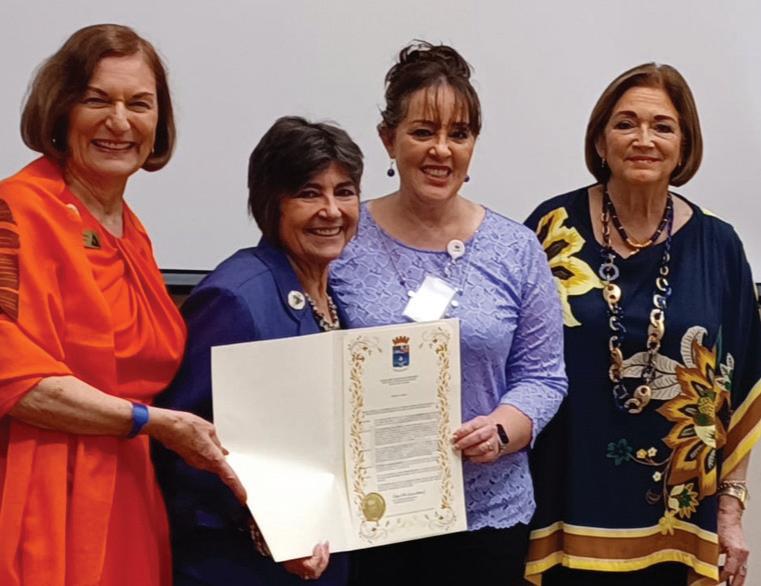
A∆K International President Ann Marie Brown, Gulf Region President Lottie Roy, A∆K Puerto Rico President Silkia Obregon (L to R) receive the Twenty-ninth Convention A∆K Puerto Rico proclamation from Olga López, representative of the mayor of Mayagüez Jorge Ramos.
lence in education to Joselyn Rodríguez, who is pursuing her doctorate in technology education.
Puerto Rico Teachers of the Year Iris Rodríguez and Esther Román were recognized for their contributions to the educational field and their positive impact on students and the community.
A dinner with the children of the Hogar Albergue para Niños Jesús de Nazaret and a donation of $1,000 to the home concluded the 2022-2024 biennium project for the sisters of A∆K Puerto Rico, which was led by A∆K Puerto Rico President Silkia Obregón.
During the biennium, sisters made many visits, daily bringing the children toys, dress clothing, pajamas, socks and shoes. They also provided personal hygiene items and a variety of school supplies and many other essential resources. Materials for the home and its maintenance were donated as well.
By Stefanie Fowler
Leadership. We know it, see it, experience it and step up to it. Alpha Delta Kappa sisters all possess leadership qualities, whether we realize it or not. Sometimes, we enter leadership positions naturally, and sometimes, we must be coaxed into stepping outside our comfort zone and taking on the challenge.
What happens when we hesitate to take on a new position? This hesitation can mean another sister has to hold a position more than once or even hold several positions simultaneously. Many of us know sisters who have held numerous offices within our organization. Have you ever considered that they may burn out after holding the same position over and over?
Why do many of us hesitate when asked to hold a chapter office? The reasons are many, but the overriding emotion might be fear: fear of failure, fear of technology, fear of too much bureaucracy, fear of criticism, fear of an impossible time commitment, fear of making mistakes, fear of stress, fear of not having help, fear of talking in front of adults or fear of creating a newsletter. Eleanor Roosevelt noted, “You gain strength, courage and confidence by every experience in which you really stop to look fear in the face. You must do the thing you think you cannot do.”

pass out materials? Could you stay and help clean up? Could you offer a ride to a sister so she can attend? Could you make a phone call to arrange for a speaker? Could you deliver items collected for an altruistic project? Could you do publicity? Do you know a teenager who might offer babysitting services for a sister who has difficulty attending because she has small children at home? Could you provide refreshments for the meeting? Could you offer a friendly phone call to sisters who couldn’t attend a meeting? Could you host your chapter’s sales table at your state convention? Can you be sure to let your leaders know that their work makes a difference and that you will always have their backs?
Think back to your initiation into our organization. You stood and with your new sisters said, “I promise upon my honor that I will, to the best of my ability, uphold the principles of Alpha Delta Kappa and that I will uphold my sisters in this organization and support them as I am able in anything which they may ask of me.”
What powerful, powerful words. There are two sides to this pledge: we promise to serve, and we promise to support those who are serving. Think about it. Each and every sister, from our newest member to our International President, took a first step. One step led to another, but each sister on the leadership path will assure you she had support. As Louisa May Alcott said, “I’m not afraid of storms, for I’m learning how to sail my ship.”
Maybe you feel that the time isn’t right for you just yet. If so, what can you do to support sisters who are conducting the business of your chapter, district or state? Everyone needs appreciation and validation. Reach out to your leaders with an email, a phone call or a handwritten note complimenting the job they are doing. Support your leaders by arriving at meetings on time and offering to help get the meeting going. Could you set up chairs? Could you
Perhaps you feel the stirring that maybe it’s time to step up and offer for an office. It’s September, the start of a new chapter biennium. What can you do? Why not choose the office that interests you and approach the sister who now holds that office? Your chapter treasurer would be delighted to show you how the budget works and get your input. Your secretary could show you how she does minutes and let you have a hand in taking minutes at a meeting. Your president-elect or your president would gladly show you how to manage forms and follow a timetable for submission. If your chapter has a sister who does the newsletter for the president, she would be happy to show you how she manages the template and creates the newsletter. Your time to learn is now, and your sisters are there to help, teach, train and encourage so that you will feel confident in holding an office in the next biennium. Remember, in Alpha Delta Kappa, we are never alone.
Henry Ford said, “One of the greatest discoveries a man makes, one of his greatest surprises, is to find he can do what he was afraid he couldn’t do.” Sisters, you have greatness within you. You joined Alpha Delta Kappa for a reason. Our organization needs all the strength, gifts and skills you have to offer. Leaders and sisters, we can support each other now and in the future to keep our organization vital and relevant. Alpha Delta Kappa needs each and every one of us.
Stefanie, a member of VA Lambda, is a Sapphire sister and the Immediate Past VA State Chaplain. She just retired as Senior Adjunct Lecturer of German at Roanoke College, VA and is a family mentor with the Roanoke Refugee Partnership.
For a few days in June, ten educators from around the U.S. visited the World Understanding Project C.H.E.A.R. at MAHOCE children’s home in Babati, Tanzania with Cam Johnston, PA Eta sister. For all of us who were unable to be a part of this tour, it is heartwarming to know that the tour participants can report tangible evidence of success. Improvements that have led to self-sustainability for MAHOCE have been made even since the closing of the 2023 International Convention in Kansas City, MO:
• Pavers were set into the courtyard throughout the site.
• The flower garden was planted with banana trees, avocado trees, pumpkins, and marigolds to help discourage mosquitoes.
• A reinforced wall surrounds the complex with embedded shards of glass at the top to improve security.
• Sports equipment was purchased with C.H.E.A.R. funds, and a coach was hired for Saturday lessons. Children are learning cooperation, new games, sports activities, and healthy exercise habits.
• A rain catchment system was installed in time for the November rainy season. The tanks can hold 4,000 liters of water (1,050 gallons). This water will be used for cleaning, gardening, and washing. Faucets can be turned off when the tanks are full to save money.
• The fields at MAHOCE produce tomatoes, sweet potatoes, and greens, which are a dietary staple. The resident students at MAHOCE help to maintain the patches of produce and learn what is required to care for them.
• The new kitchen is fully functioning.
• Project C.H.E.A.R. contributions allowed the center to construct an Emergency Room, which provides temporary housing and protection for children and families in crisis that are referred to MAHOCE.
• All the children residing at MAHOCE were able to get new mattresses and blankets.
• MAHOCE can now provide a home for up to 44 children at a site that it owns.
• Funding from Project C.H.E.A.R. was used to purchase shelves, books, and computers for the Library and Multimedia Resource Classroom. Local carpenters built all the furniture.
• Juliana, raised and educated at MAHOCE, is the Alternative School teacher and teaches Saturday computer classes.
• MAHOCE also provides hope for local families seeking educational support for their children at government schools. The Harambee Foundation continues to raise funds for their educational expenses.
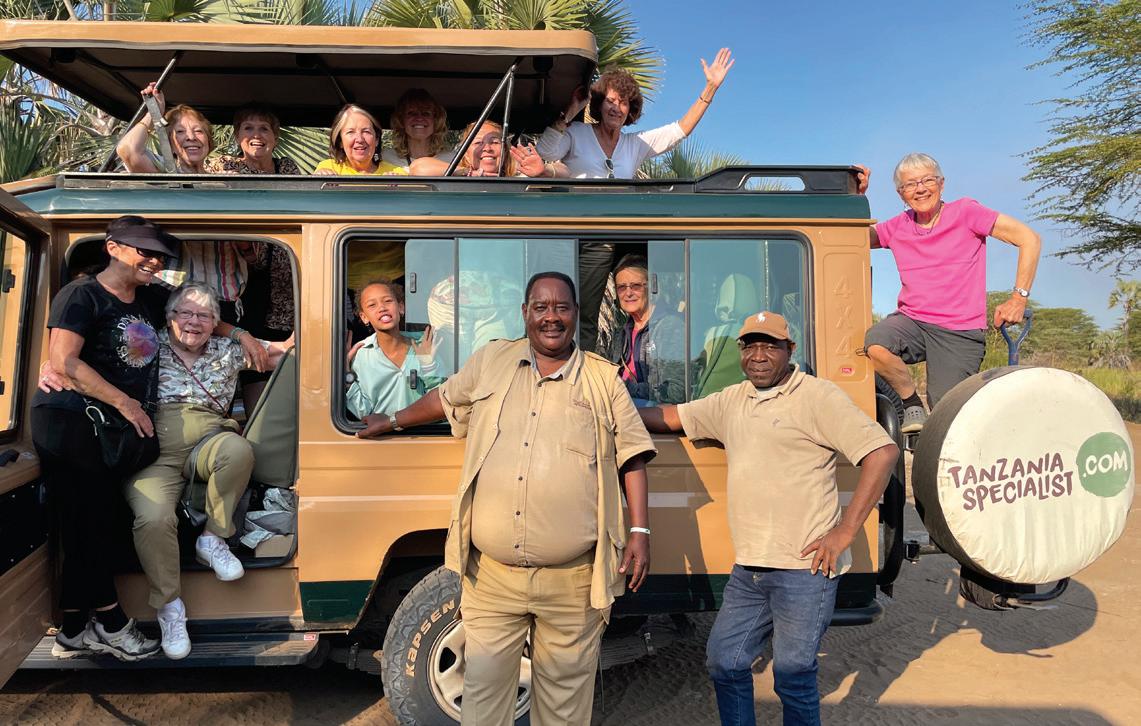
To make way for a new project, Alpha Delta Kappa Foundation has officially closed C.H.E.A.R. as its organizational effort for 2021-2023. The Harambee Foundation expressed its gratitude. “Thank you, Alpha Delta Kappa sisters, for joining hands with us as we continue to empower through education. We are growing children by planting seeds of hope.”
Article by Cam Johnston, PA Eta and Grete Lima, CA Beta Iota Co-Treasurer and 2021-2023 International World Understanding Chair.
October 1, 2024, is the deadline for submitting World Understanding Projects for the next biennium. The updated guidelines, timeline and application form are on the International website under the Foundation heading and the subheading World Understanding Project.
“The World Understanding Program is back, and the committee has worked very hard to update the program. It is ready and looking forward to having a project that can make a difference in the world around us,” said International World Understanding Chair Joyce McAloon.
The last World Understanding Program, Project C.H.E.A.R. ended in July 2023. The World Understanding program was paused while the International Board reviewed and revised the guidelines.
Prior to the 2021 International Convention, voting for candidates, bylaws and resolutions took place in person during business sessions at the convention. That changed in 2021 as many organizations, including Alpha Delta Kappa, struggled to adopt ways of conducting business electronically and holding virtual conventions when in-person gatherings were not recommended and venues were canceling convention contracts. Using “Robert’s Rules of Order” as a guide, “Rules Governing a Virtual Convention” was adopted by Alpha Delta Kappa.
The International Executive Board convened the Ad Hoc Committee on Voting in response to member concerns about how voting for leadership and on bylaws was conducted at the 2023 International Convention when members met in person to celebrate the 75th anniversary of Alpha Delta Kappa. Because governance decisions are made at the Convention, and because decisions were made in 2023 through the rules governing a virtual convention, some members expressed concerns that proper procedures had not been followed as in-person gatherings returned.
The Ad Hoc Committee held eight Zoom Listening Tour sessions in January and March and invited members to participate in a Jotform survey to express their ideas related to voting. At each one-hour listening session, committee members facilitated small group discussions in breakout rooms where members responded to a set of questions. The Jotform survey included the same questions as the in-person sessions and gave respondents an opportunity to request personal contact with the committee chair if they had additional comments to share. Committee members compiled the responses from each of the Listening Tour sessions and Jotform surveys. Responses consistently fell into a number of categories summarized here:
QUESTION 1 –What are the pros and cons of voting in person at the Convention?
Pros:
• Seeing/hearing candidates in person – seeing their reactions, getting a sense of their personalities
• Listening to discussion in person - the interaction on the floor, listening to the exchange of dialogue in debating resolutions and bylaws
• Creating a reason to go to the International Convention and a chance to realize you are part of an organization larger
than your chapter/S/P/N
Cons:
• Cost of technology and technical issues with voting machines
• Time intense – takes time, which can be frustrating; long discussions; could have other breakout sessions
The cost of attending the convention in person and physical challenges are limiting factors for some individuals and chapters
What are the pros and cons of voting prior to the convention?
Pros:
• Candidates and members know the results prior to coming to the Convention
• Delegates can rewatch the videos at will, compare speeches, take notes
• More efficient. Delegates can vote on their own time, more time to think about issues
• Increase member participation in the voting process
• More time is available at the convention for more interesting topics, speakers and programs
Cons:
• Technology-dependent voting presented numerous challenges – frustration with technology availability; some members not knowledgeable about virtual meetings; the internet is spotty preventing access for some members
• Toggling back and forth between screens was confusing. Non-tech-savvy members struggled and it was a struggle to resume and find your place when you had to go in and out of the site.
• Managing the timeframe for staggered voting windows was a challenge; schedules of discussion and conversation threads were confusing; the process was spread over a long period of time, wearing on personal time
• The voting schedule was challenging for active teachers -end of the school year, exams, other responsibilities led to forgetting to vote
• Voting prior to the convention makes the convention a conference since no business is conducted. There is a concern that this may lead to decreased in-person participation
What are the pros and cons of using a hybrid (both online and in-person) method of voting?
Pros:
• More members would have access to voting.
• A hybrid model provides an opportunity for members to share their thoughts, engage in dialogue, ask questions for all to hear and make informed decisions.
• Candidate presentations and discussions on bylaws could be live-streamed with a voting block set aside afterward for members to vote remotely from their phones, laptops, or computers set up at the convention site.
Cons:
• Members participating virtually may not be able to participate in a discussion
• Members may not be comfortable with the technology
• Voting blocs ranging across the many time zones of our membership may be complicated to manage
QUESTION 2 – W hy is it important to you to attend the International Convention?
• Personal reasons: networking and sharing (learning new ideas from other S/P/Ns), visiting new and different cities, sisterhood
• To conduct business: to take care of and learn about Alpha Delta Kappa business in person, to experience the democratic process – debates and discussions
• Seeing the big picture: participating in workshops (Ed. Symposium), feeling the unity of Alpha Delta Kappa, meeting International leaders, listening to guest speakers, feeling valued as a member and important to the organization, celebrating successful altruism
QUESTION 3 – How could we use technology to increase member engagement with candidates and proposed business items in preparation for voting at the 2025 International Convention?
• Have multiple meetings (like the listening sessions) with candidates who are offering for office who could present “live” via Zoom. Record the session so it can be shared and viewed multiple times.
• Have a meet the candidates Zoom session or hybrid session to reach out to members to help them feel qualified to vote and to be a valuable part of the session.
• Hold proposed Bylaws/Resolutions listening sessions for the issues and reasons behind the proposals. In breakout rooms, questions could be asked and answered. Focused discussion for each proposed bylaw/resolution could be recorded and distributed to be viewed and discussed at chapter meetings.
• Make voting clearer, and more accessible, and make sure everyone can access video presentations of candidates and bylaws/resolutions. Send text notices and voting reminders closer to election time.
• Consider teacher schedules (May is not a good time for vot-
ing). Communicate dates and deadlines using multiple formats (email, texts, blasts, CONNECT).
• Provide tutorials for voting and discussion and to familiarize members with technology.
• Debate bylaws and resolutions in person and give virtual delegates the opportunity to vote from home.
QUESTION 4 – What about this process has helped you clarify your thoughts about the issue of voting?
• Members felt comfortable sharing their thoughts and ideas – “We’re all in this together”
• The listening session is a good idea and format –smaller breakout rooms facilitated the conversation; the expectation was to participate and not just listen
• It was beneficial to hear others’ thoughts, ideas and opinions – we were pushed to consider other sides of the issue
• Participants appreciated the opportunity to share concerns and points of view with the committee
• Use an open forum concept to introduce candidates and resolutions/bylaws to members. There is interest in hearing candidates “live” rather than in recorded presentations.
• Educate members on the purpose, process, deadlines and importance of voting.
• Consider changes to the voting timeline and how notice to voters is provided.
• Consider alternate ways to present the bylaws discussion and amendment process. Debate blocks were challenging and cumbersome for members to access.
• Determine who gets to vote. (defined in Section 3, Article IX of the Bylaws)
• Consider exploring a hybrid structure for voting at the International Convention.
The committee wishes to thank the members who responded to the survey and those who participated in the Listening Tour sessions. We are grateful for members’ willingness to share their candid observations about the process of voting, which is an essential tool in the governance of Alpha Delta Kappa. Our commitment was not only to listen to members but to evaluate and incorporate the ideas that emerged from this process. We appreciate the opportunity to provide the International Executive Board with our findings and present our recommendations for future actions.
The Committee members are Ann Quinlan, committee chair, IEB; Lauren Balint, VA Gamma Chi; Roberta Casabon, IEB; Kathy Learn, IA Upsilon; Barbara Nore, Regional President-elect Northwest; Barbara Stanfield, NM Gamma and Christi Smith, Executive Director and ex officio member.
By International DEI Chair Pat Valle, Southeast Region DEI Chair Kionna-Alycia Keels and CB Guess
In the spring of 2020, International Past President Judy Ganzert received a letter that spurred her to action. The Alpha Delta Kappa sister who sent the letter spoke of feeling unwelcome in our organization. As any good leader would, IPP Ganzert wondered if this was an isolated incident. Unfortunately, she found out that it was not. In the spring of 2020, the Diversity, Equity, and Inclusion (DEI) Committee was established.
The purpose of the DEI Committee is to strengthen A∆K through a commitment to practices that respect and value each member for their unique qualities. It is not something to fear. A∆K supports public education and our sisters in the classroom. The committee broadens our perspectives so that we encompass the diversity of our students, their families and the members of our communities.
The Southeast Region (SER) DEI Committee also facilitates professional development opportunities for sisters through online book discussions using books that encourage dialogue about diversity, equity and inclusion. Each regional conference in this biennium held a workshop session called “Peel Back the Onion.” Participants engaged with a protocol to disrupt potentially harmful comments, actions or incidents. Sisters work in groups of three to unpack difficult situations, broaden perspectives and gain insight. The SER Conference had additional sessions related to DEI. A session led by Virginia sisters explored how to encourage and invite more inclusive conversations, actions and relationships in A∆K. Two South Carolina sisters led a session in which they shared a list of books and lesson plan ideas to be used to create environments where all people are accepted and valued.
So, what is DEI? How do diversity, equity and inclusion create a stronger Alpha Delta Kappa sisterhood?
D- Diversity: Consider the diverse people and perspectives within Alpha Delta Kappa.
When people think of DEI, they often think of women of color or gay individuals wanting a seat at the table. And yes, diversity does involve race, gender and sexual orientation and being mindful of the challenges that marginalized people face. However, diversity is so much more than that. It’s about culture, ethnicity, religion, age, gender identity, body type, socioeconomic class, ability status and other social identities.
Alpha Delta Kappa sisters are thoughtful and caring
by nature. The goal of the International DEI Committee is to strengthen our organization as we seek to be even more thoughtful and caring. There is so much that we have in common as women educators, but we are not the same. As we grow, we seek to welcome older sisters, younger sisters, disabled sisters and sisters of all faiths. In other words, as we seek growth, we continue to consider potential sisters who are outstanding educators and who may or may not be exactly like us.
E - Equity: Consider the policies, practices and positions of Alpha Delta Kappa.
Think of the picture many of us have seen of three boys watching a baseball game from outside of a fence. One is very tall, the other average-sized, and the last one quite short. Equality is putting the same-sized box underneath each boy so that he can see the game. It doesn’t make sense. The tall boy doesn’t need a box at all, while the shortest young man can clearly use two. Equity is making sure each person has what they need in order to be successful. In the case of Alpha Delta Kappa, equity means that all sisters feel that their needs are met, therefore deepening a sense of belonging.
I - Inclusion: Consider the power, voice and organizational culture within Alpha Delta Kappa.
Do the members of your chapter feel empowered to speak up? Does the culture of your chapter intentionally include everyone? If not, this is a conversation worth having. When our sisters feel connected, and respected, and that they are actively asked to contribute, they will remain in the organization. Even better, they will then confi dently invite others to join A∆K.
Our focus on diversity, equity and inclusion might just be what Alpha Delta Kappa needs in order to see the growth and retention that we are seeking. One of the purposes of A∆K is “to strengthen the education profession through a commitment to diversity and inclusion practices that respect and value each person for their unique qualities.” As sisters and as teachers we have an opportunity to educate others and help them realize that DEI is understanding that we are all different (Diversity), we all want to be treated fairly and justly (Equity), and we all want to feel like we belong (Inclusion).
Pat Valle is a member of WA Alpha Delta, Kionna-Alycia is a member of SC Chi and CB Guess is a member of SC Alpha Tau.
By Susan McNaught, OR Epsilon
Frederick Douglass said, “Once you learn to read, you will be forever free.” When we talk about literacy, we usually focus on K-12 education. But what happens to those who leave school without being able to read?
In Salem, OR, there is a place for those adults. The Mid-Valley Literacy Center (MVLC) was founded about 15 years ago to address those needs. It has a staff of four part-time workers. But the tutors… well, two dozen volunteers, tutor GED in English and Spanish, ESOL, computer skills, citizenship, and a newlycreated program for those whose reading level is below that needed for a GED. There are many retired teachers, an engineer or two and some who just like to watch the light bulbs come on for the students.
I have the privilege of being one of those tutors. My Epsilon sister, Carolyn Pitt, subs from time to time.

But this is not about us. This is about John (not his real name). John is 62 and learning to read. He left school sometime in the tenth grade with a reading level of about first or second grade. He says he tended to sit in the back of the class and pretend to be busy. Flash forward. John worked in construction until he was badly hurt and ended up on Workers’ Compensation. He became divorced at about the same time. He floundered. We will not talk about some of his less-than-brilliant decisions. At any rate, a few years ago, he tried the local community college’s GED program. There were thirty students in the class. And it was still too easy to sit in the back of the class and pretend to be busy. He floundered again. Finally, one of the other students mentioned the Literacy Center. John thought, why not?
Last year, he gathered up his courage and found his way to MVLC. He tried the GED language arts class, and I realized he was out of his depth. So, because that is what teachers do, we created a program just for him. There was another lady there who had graduated from high school but never got the phonics to help her read and spell; she was included. She and John had a good time sharing stories about how they covered up their inability to read. They commiserate about how exhausting that was.
John is now reading at about a fourth-grade level and is much more confident. He admits that he used to throw notices and mail away when he could not read them, which got him into a bit of legal trouble.
He amassed some DUIs when he was first hurt. When the notices came to his house, he tossed them. When the notices about the notices came, he tossed those, too. Finally, he ended up in court with the DA ready to toss him in jail. The staff at the Literacy Center wrote letters about how he was not ignoring the notices but could not read them and how hard he was working now on his reading skills. The judge did not put him in jail. He did not even fine him. He gave him a bunch of hours of community service. John is free.
Last week, he came into the center with a grin about the size of Montana. “I am going to be a grandpa!” he announced jubilantly. After more conversation, he said happily, “I could not read to my daughter, but I WILL be able to read to my granddaughter.”
It is easy to get lost in statistics or to wring our hands about the state of literacy in the U.S. With centers like MVLC and tutors like the OR Epsilon sisters and others, men and women like John are learning to read. Each learner is better for it. Each learner’s family is better for it. Each community is better for it. Freedom looks a whole lot like an open book.


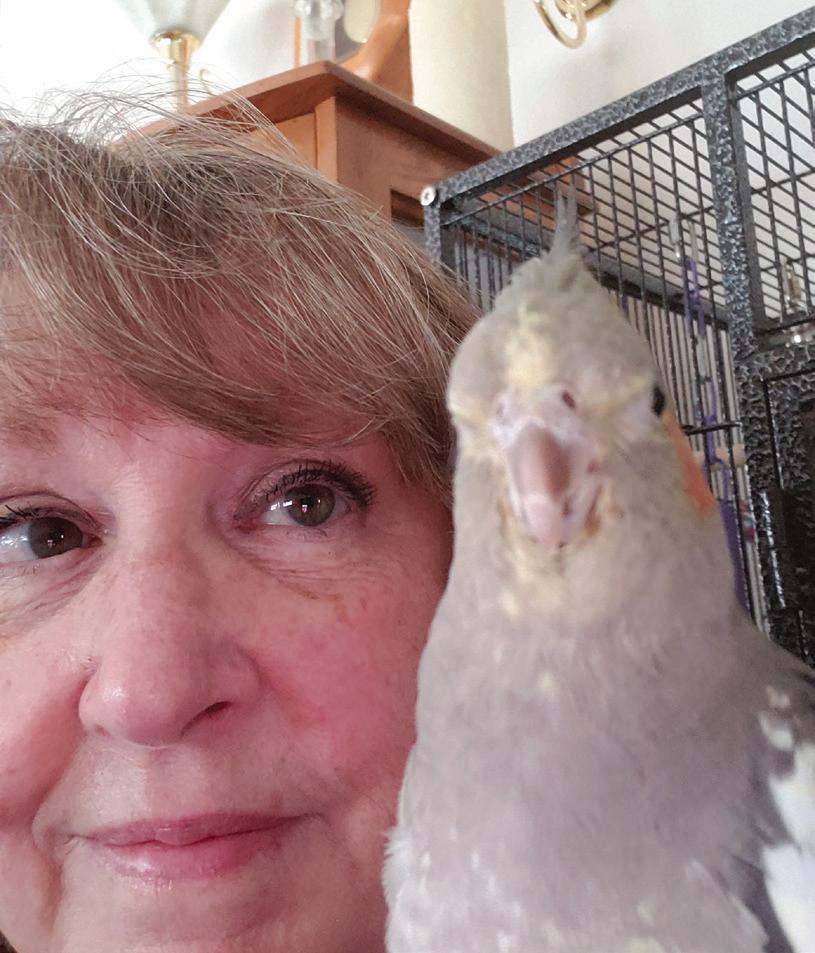
By Ontario A∆K President Maria Luisa Lebar, Ontario Sigma
Maria has worked in many aspects of education for over 30 years including working for the Peel District School Board in Mississauga, Ontario, Canada, as a classroom teacher, Early Literacy Teacher, Instructional Resource Teacher, and Instructional Literacy Coordinator as, well as, for the Ontario Ministry of Education as a Student Achievement Officer. She has presented at national and international conferences in Canada and the United States. Maria Luisa is the author of “The Four Roles of the Numerate Learner “and “Moving Math,” which is about how to use thinking skills to help students make sense of mathematical concepts and support numeracy development. Currently, she owns Lebar Learning and Consulting Services and works as an independent literacy consultant.
Who are the students that we teach today? How do we implement a humanizing pedagogy that centers students’ identities so that they feel valued and respected in an ever-changing world? It is essential to differentiate between critical thinking and critical literacy.
Critical thinking skills require learners to make connections, inferences and interpretations so they can deepen their understanding of texts read beyond the literal level. Additionally, they must analyze a variety of texts by deconstructing the structural components, text and language features and vocabulary that authors intentionally use to convey their message. As readers learn to analyze, they are also evaluating texts to determine the effectiveness of the choices authors make to create a text.
Critical literacy strategies compel readers to think about how literacy skills can be used to make the world a better place. They, therefore, need to apply critical thinking skills such as analyzing and evaluating to use critical literacy strategies. What is different about critical literacy is that it focuses on issues connected with equity, fairness and social justice. Readers adopt a critical stance as they analyze the perspectives of people with different identities, beliefs, interests and values. The analysis process requires students to consider the author’s background, the time and place in which the text was created, and the schema and lived experiences of readers that shape how they interact with a text. As readers become critically literate, they are identifying gaps (e.g., information) and silences (e.g., voices of certain people or groups of people) that have been left out. They are examining assumptions, biases, culture, and power relationships that position readers to think in a particular way while questioning their own perceptions of their world.
As educators, it is imperative to create conditions for learning that will engage students in opportunities to question, challenge, and interrogate the everyday world. If we view our classroom as a community of learning, then both the educator and students need to be equity-minded. This means that, together, they must examine ways of looking at all kinds of texts including written, spoken, visual, digital, and performance to interrogate the messages, attitudes, and values that are implied because of the language used, the belief of the creator/ author, and the voices (perspectives) that are being advantaged while others are missing or silenced.
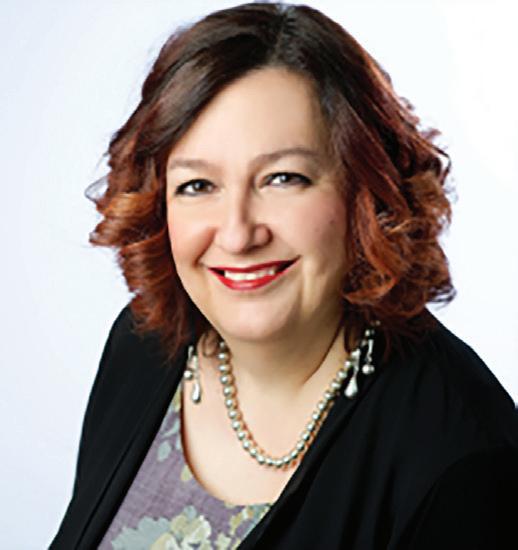
One key principle of critical literacy is that no text is neutral. Every text is created by an author who has bias or who represents certain views and wants the reader to see the world in a specific way that may be influenced by power, privilege and people’s ideas. We need to encourage students to question beliefs and values presented in texts that are often taken for granted.
It is important to create critical literacy spaces as soon as students enter schools. As consumers and creators of texts, students must participate in dialogues about texts that inspire them to think about stereotypes that may be portrayed. This means disrupting commonly held assumptions about their everyday world. For example, Grade One students were asked to draw a picture of “a teacher.” The images were posted around the classroom and students were invited to analyze the drawings of a teacher. They were asked to think about gender, and they noticed that in most of the drawings, the teacher was a female. Students also considered race, age and physical appearance. It was interesting to see the stereotypes surfacing through the analysis. Most of the drawings had the teacher wearing a dress, looking young, being much taller than the students, and standing in front of the board. The students’ drawings revealed so many perceptions, which needed to be disrupted. The educator, in this case, needed to prompt interrogation of these perceptions through critical literacy questions such as:
What do the creators of the drawings want you to believe?
What do the pictures of a teacher make you think about?
Why do you think that teachers have been drawn in this way?
When you look at all the drawings of a teacher, do you think
that something/someone is missing? Who has been left out?
How might you change your drawing of a teacher?
To demonstrate the disconnect between the students’ perceptions and reality, the class participated in a school walkabout, and students were asked to observe who was in the building. This was followed up by another critical dialogue in class that introduced the word “bias” to the Grade One learners.
To cultivate a critically literate environment, educators are encouraged to read a variety of culturally relevant texts that represent a wide range of identities, cultures and themes. Through these narratives, they can invite students to think about why things are the way they are among people, within communities, and society at large in order to question the unjust status quo by noticing and naming oppressive actions that may be implied through the representation of characters, language choice, illustrations, theme, and elements of text structure. Two critical literacy strategies to be emphasized are switching and juxtapositioning.
Switching is an effective way to prompt students to use problem-posing to become active thinkers about the world in which they live. This strategy has learners responding to questions and imagining an alternative view of a story by switching the gender, clothing, emotions or race of the character or switching the setting, theme, and language used. Prompting questions might be…
How might this story be different if the character were a boy/ girl? (gender switch)
How might the character act differently if the time and place of the story changed? (setting switch)
How might the story “The Paper Bag Princess” have a different ending if the character wore something other than a paper bag? (clothing switch)
Juxtapositioning is a critical literacy strategy that is about contrasting. It requires readers to examine two contrasting texts or pictures next to each other to help them view the texts through different lenses. Juxtapositioning encourages learners to consider alternate perspectives as they reflect on how the same event or situation can be perceived in diverse ways, depending on one’s schema and/or lived experiences. When readers are using this strategy, they are analyzing and interrogating the authors’ biases about two texts that have been written about the same topic or convey a similar message. For example, one could place two images of “ducks” in different contexts next to each other. One photo portraying a positive view of a duck swimming in a pond while the other photo shows a duck swimming in a lake contaminated by an oil spill, which would represent a negative view.
Prompting questions might be…
What is the same about these two images?
What is different about these two images?
What is the creator trying to tell you in the first picture? Second picture?
What have you learned about ducks by looking at these two images?
How has what you already know about ducks changed?
How do the two images make you feel? Why?
How do the messages shared from these pictures make you want to take action?
In our ever-changing world, it behooves educators to embrace a critically literate mindset to create learning environments and design learning experiences for today’s learners that will inspire them to become agents of social change and champions of an equitable world that values all voices and identities.


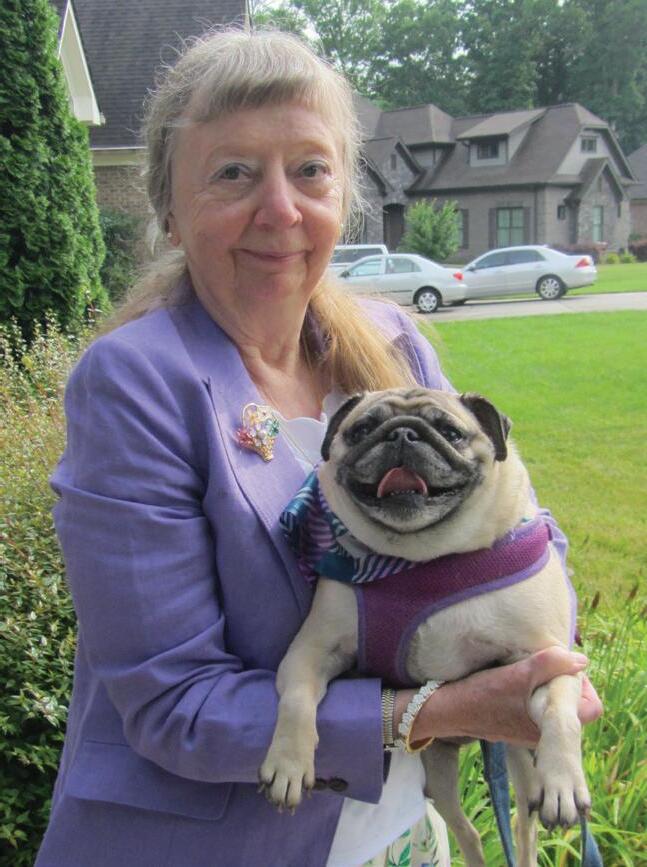
Miss Muffy is a pug. I went to Alabama to get her. She is a southern belle and that is why we call her Miss Muffy. She likes to go for walks to see some of her friends including a cat who lives across the street. Her favorite toys are Moosey and Miss Penguin. She likes to shake them up and make them squeak.
~Shannon LorenzoRivero, TN Chi
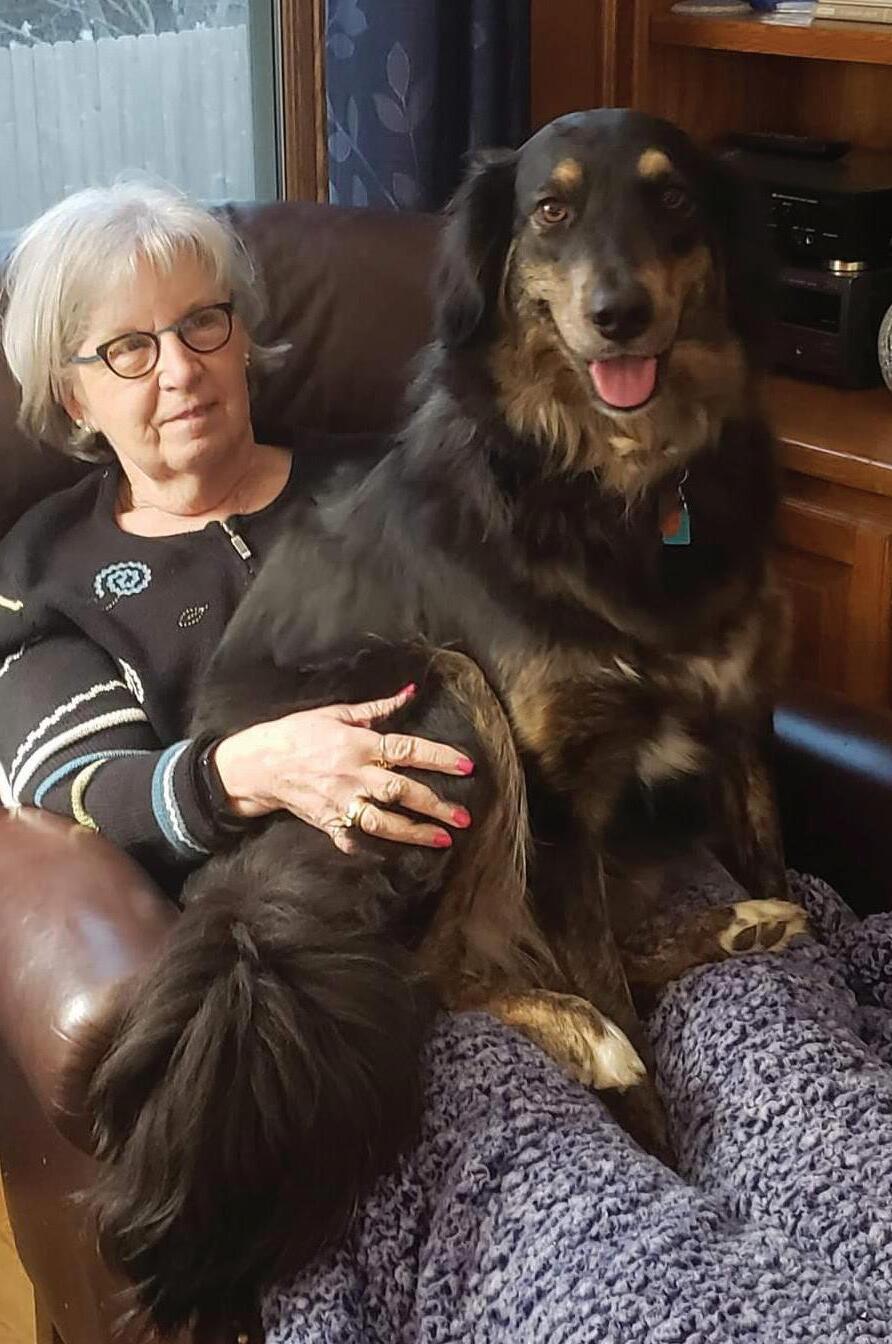
Cynthia Kelley, KS Alpha Alpha and Daisy
This is Daisy who is a 4-year-old rescue that has stolen our hearts. She’s a lapful. We were going to get a small older dog. The dog does pick you, and we are so glad and grateful that she did. She’s Miss Congeniality of the neighborhood as she greets everyone by lying down ‘til they come to pet her and say, “Hi!”
By Sue Pelchat, KAPPAN Writer, CT Mu, Past International President
Veterans Day on November 11 is a U.S. holiday dedicated to veterans of all wars. In Canada and Australia it is known as Remembrance Day and also celebrated in November. The KAPPAN honors all members who served in the military as we celebrate Veterans Day this year.
We asked A∆K members who are military veterans and entered the teaching profession following their service about their leadership opportunities, training and experiences and how they applied it to their teaching. It turns out that deciding to transition from the military to the classroom is not as great a leap as one might think.
Erylin Serra-Ward, CO Eta, teaches high school Spanish and is an AVID teacher who encourages college and career readiness and success. She retired as a Staff Sergeant (SSG) after 15 years in the Army. She served as section lead and participated in three combat deployments, two in Iraq and one in Afghanistan, with rotations overseas in Germany, Korea, Kuwait and Qatar, among others. She says her experience in training and instruction enabled her to manage the classroom and truly connect with students. Erylin decided to teach after the military. She said it was her way of continuing to serve her community directly. As for her preparedness to enter the classroom, she said that people could never be fully prepared and that one would lie to herself if she believed a person could always be ready for what’s coming. “In one’s teaching career, every year brings more to learn,” she said, “while each group of students brings new challenges. And, although it’s difficult at times, it’s rewarding to see students be successful.”
Kelly Garry, ID Epsilon, is a 34-year sixth-grade science teacher. A retired Chief Petty Officer with the U.S. Navy Reserve, she served over 30 years between 1992 and 2022. She was attached to the Navy Reserve Center Boise in Boise, ID, and was crossassigned to Chinhae, Korea, for 16 years, traveling to Korea over 16 times for two to three weeks at a time to support Navy Exercises. She performed several duties and three times was pulled to become the base Commander’s Chief Yeoman. Other times, she served as a Battle Watch Officer or ran the Joint Reception Center. For five years, she also served as Leading Petty Officer (LPO) for Bremerton Medical Unit. Becoming a Chief Petty Officer requires many leadership courses and training. “Basically,” she explained, “Chiefs manage people.” All of her training translated into classroom management.
She emphasized patriotism, advancing the history of the pledge of allegiance and flag etiquette during school and Veterans Day programs. Garry always wanted to be a teacher and, in 1991, during her junior year of high school, started as a half-time kinder-
garten aide. She joined the Naval Reserve in 1992 to further her desire to teach and because her father was the oldest of nine boys who were all in the Navy. She feels fortunate and proud to have had and loved two careers. She loves children and gets to teach, and she loves the Navy and was able to serve.
Cyndi McDougall, DE Epsilon, is a retired high school special education teacher. She was a Staff Sergeant in the U.S. Air Force, serving from 1982 to 1992 as a C-130 Aircraft Maintenance Specialist.
Her duty stations were Pope AFB, NC and Yokota Air Base in Japan. While stationed in Japan, her assignment was dedicated crew chief (DCC), an aircraft mechanic assigned to and responsible for a specific tail number aircraft. She flew where and when her aircraft flew. Her unit deployed to Saudi Arabia for Desert ShieldDesert Storm in late December of 1990.
As a DCC, she supervised specialists who performed necessary actions on her aircraft. She was also a trainer of new personnel assigned to her aircraft and work center. She attended Noncommissioned Officer Leadership school which afforded her more leadership roles.
Upon separation from the service, she served as a classroom mom for her youngest son’s third-grade class. His teacher and that opportunity made her realize she wanted to teach. A self-proclaimed jack-of-all-trades, she team taught all subjects, including auto mechanics, art, physical education and wood shop.
“Our children are our future, and we must guide them in the most positive direction,” she said. Cyndi hopes her students realize that though formal education may come to an end, learning is a lifetime endeavor. She also hopes that she has encouraged at least one student to enter the field of education.
Pat Banks, Kentucky Chi, a high school guidance counselor, attended the Naval Officers’ Candidate School in Newport, RI, receiving her commission in 1970. She was stationed at COMOCEANSYSLANT in Norfolk, VA, as a communication watch officer and served in the Navy for two years as a Lieutenant JG, equivalent to the office of First Lieutenant in other branches. She supervised teletype operators who received and sent all messages to and from her duty station command. She was responsible for decoding and delivering all incoming classified messages to the appropriate officer.
Pat’s military experience allowed her to supervise others and develop a culture where everyone worked together to ensure they met the goals of the office and supported the mission of their command. Keeping information flowing helped Pat hone her commu-
nication skills. That, plus leadership training and discipline, were assets in both the classroom and the Guidance Office.
To attend Officers’ Candidate School, a bachelor’s degree was required. Pat graduated from Purdue University as a Home Economics Education major and then reported for duty for officers’ candidate training. When her service requirement was completed, she returned to school and earned her Master’s degree in Guidance and Counseling with the help of the GI Bill for Veterans. Her first classroom teaching position was as a junior high home economics teacher. She felt well prepared for teaching, having been actively involved in 4-H for ten years. Her education and military experience anchored her confidence, and she felt ready to meet students. She was honored to work alongside her students through their high school journey, helping them with life issues, maneuvering the teenage years and making decisions about
their future. She hopes her students will remember that she cared about them, encouraged them, helped them see possibilities and reminded them that being responsible, showing kindness and internalizing happiness were important qualities to carry forward.
Pat considers it an honor to have served in the U.S. Navy and shared a few personal experiences that prove that military life is not without its lighter side. She outranked her husband who had to salute her in official circumstances. As their sons grew up, they really liked to tell that story. During officer candidate training, she failed a room inspection because her towels were folded incorrectly. She now pays close attention whenever she launders and folds towels. During officer candidate training, men and women had separate programs but ate meals in the same mess hall. It sometimes took the whole time for her to recognize her husband Carl in the sea of men, all with shaved heads.
By Ellen Roderick, MD Beta and Foundation Board member
In March, the Alpha Delta Kappa Foundation issued a new digital publication, “Friends of the Foundation,” located on the Foundation home page of the AΔK website. The Qs & As below explain the purpose and importance of this publication. They also include instructions on how to donate online to the Foundation.
What is the purpose of the publication?
There are multiple purposes: (a) to acknowledge and thank donors; (b) to publicly recognize sisters and groups being honored, and who is honoring them; (c) to publicly recognize sisters, friends, and family being memorialized, and who is memorializing them; (d) to recognize Friends of the Foundation making monetary donations in direct support of the Foundation; (e) to recognize Heritage Society members who have left a financial legacy for the future of AΔK; (f) to raise awareness of the Foundation’s giving program.
What does the publication contain?
The virtual publication lists (a) members of the Friends of the Foundation by biennium level of giving (i.e., Gold Key, Columns, Lamp, Violet); (b) donors honoring a sister or special AΔK group; (c) donors to the Leadership and International Presidents’ Fund; (d) sisters making donations in memory of sisters, family and friends; (e) Heritage Society members.
How has donation information been shared with members in the past?
In the past, the KAPPAN published “Honor a Sister” donations and listed members of the Heritage Society and the Hall of Benefactors (replaced by Friends of the Foundation Biennium Levels of Giving). This new virtual document shares a wide range of donations to the Foundation.
Why is this publication of importance to AΔK?
It is vital that all organizations acknowledge and thank their donors. Without dedicated donors, the Foundation
would not receive replenishment dollars to (a) award scholarships and grants; (b) fund our two major International altruistic projects: St. Jude Children’s Research Hospital and the Alzheimer’s Association; (c) conduct the AΔK-ITE Program; (d) implement the Leadership Academy; (e) recognize excellence in education (i.e., EiE Award); (f) help those involved in major disasters; (g) secure the future of AΔK’s altruistic and scholarship programs.
Why is this publication important to you as a member?
It is important for multiple reasons: (a) if you have made a donation, it is a public acknowledgment and an act of thanks; (b) if you have been honored, you should be aware that a sister has cared enough to donate in your honor; (c) if a dear friend or relative has been memorialized with a donation, you should be aware of that act of kindness;(d) if you are a recipient of Foundation funding, you need to know who those sisters are who are making this possible for you.
How did the sisters listed in the publication go about making a donation to the Foundation?
The purple boxes on the Donation page under the Foundation home page on the International website show the donation categories. There are 11 different Foundation funds. Online donations are preferred. Donors may send a check to A∆K Headquarters specifying in the notation line the fund receiving the donation. Donations may be made at the Foundation table during regional conferences and International Conventions.
How often will a new “Friends of the Foundation” edition be published?
The first edition covers a 12-month period. The Foundation Board plans to update the publication every six months.
“A∆K members are “givers” - altruism is one of our organization’s hallmarks,” said Ellen Roderick, 2021-2026 Foundation Board member. “The Board thanks you for your extreme generosity.”
The 2025 Educational Symposium Committee announces the call for presenters for the International Convention to be held in Austin, Texas, July 10-13, 2025.
In 2023, the Educational Symposium made history with the first hybrid symposium in Kansas City. There were over 140 sisters presenting live, in-person, virtually and through pre-recorded sessions, many of which were available after the convention to virtual and in-person educational symposium attendees. There were many great offerings on a wide variety of topics.
So, what’s in store for 2025? Applications for presenters are open. Can’t make it to Austin but want to present? Pre-recorded sessions will be held in the virtual library. In-person sessions will be one hour, with travel time added to reach the next session. Your help is needed to provide a selection of amazing presenters, offerings and learning choices as we build “A Bridge to the Future.”
Is there something you’re passionate about? Are you an expert in a proven educational “best practice” you could teach others? Do you have a special experience or solution to a problem that might be helpful to other teachers or chapters? Sharing the love of your

talents is the committee’s request for presenters. Sessions will focus on the following Pathways:
• Building a Bridge for Empowerment: Leadership, DEI, Innovation
• Building a Bridge for Connections: Sisterhood, Membership, World Understanding
• Building a Bridge for Support: Classroom Best Practices, Altruism, Officer Training
For the first time, applications are being taken to be featured speakers during the convention. Do you have a topic or presentation you would like to share in a 10, 15, 20 to 30 minute podcast type format with a live audience?
Why would you want to be a presenter or featured speaker? What’s the benefit of presenting? Hear what these sisters have to say about it:
April Bond, KY Alpha Theta: “One of my favorite memories includes Cindy Elmore, SC Tau, who was doing a session right before mine, and she offered to let me use her equipment so I wouldn’t have to bring mine from Kentucky. She even stayed and participated in the session!”
Sue Saccomando, VA Tau: “I have presented twice – the fun for me was the research and discovery and then sharing it with sisters.”
Annette Wauchop, VA Beta Beta: “I wanted to spread information about organ donation because I am a liver recipient and the transplant saved my life. I wanted to encourage more sisters to register to be donors.”
Anne Brooks, FL Gamma Omicron: “The room was packed and the audience included A∆KA and spouses. Barbara Haney, VA Mu, and I had a fun time putting slides and gear together for it. It always feels wonderful for attendees to say how much they learned and how they wanted to follow up on it.”
“If you are just this kind of leader, please share your talent. If you attended a great presentation from one of your A∆K sisters, invite that sister to apply and present for the Symposium. If you know of a dynamic potential presenter, invite her to apply, too. This would be a great recruiting tool. We need you. Come join us to make history yet again. On behalf of the Educational Symposium Committee 2025, thank you for your attention and excitement as we gather to learn from each other,” said International Convention Education Symposium Committee Chair Jennifer Robitaille, ME Alpha.
Serving with Jennifer on the committee are Sara Armstrong, CA Alpha Alpha; Dawn Hudson, GA Beta Epsilon; Headquarters Staff Liaison Phyllis Robinette, CO Eta; IEB Liaison Mollie Acosta, CA Xi, and Carol Valentine, VA Beta Delta.
Applications can be found at https://tinyurl.com/2025adkpresenter or see the “Call for Presenters” graphic for a scannable QR code.
Jennifer Robitaille, Education Symposium Chair, ME Alpha


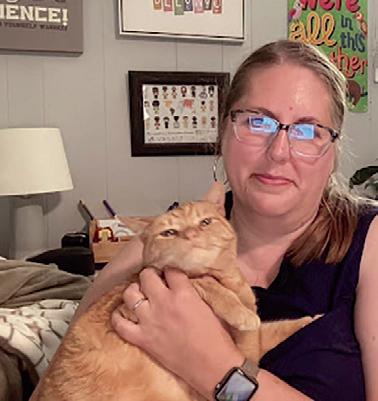
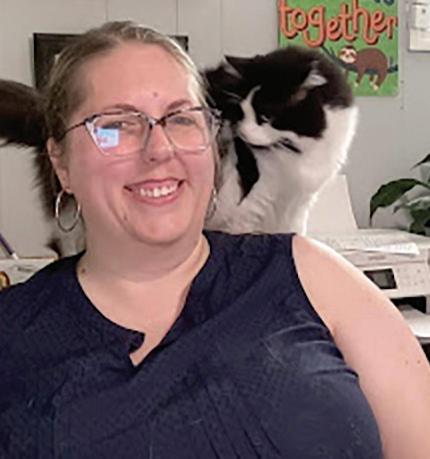
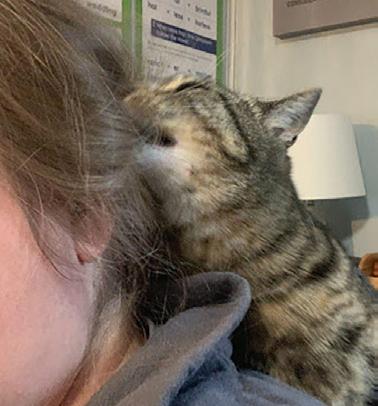
This year I left the classroom and took a position at the Kentucky Department of Education. One of the perks of this new position is that I get to work from home. You can see here, my three cats are my constant support. The orange cat is Carrot, the black and white is Rabbit and the one gray tabby that is grooming me is named Kahluah.
~Hillary McWhorter, KY Mu
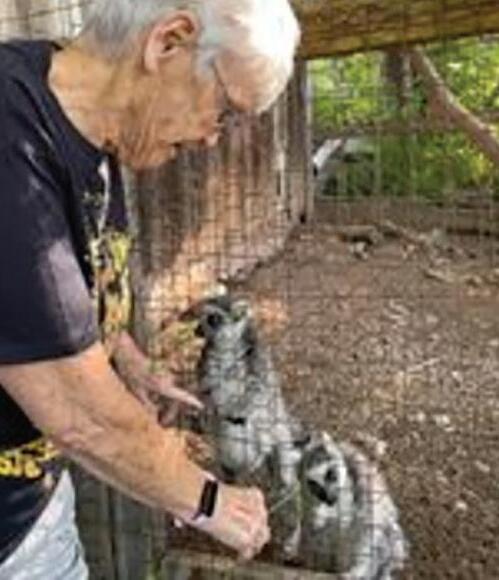
Thelma and Louise are two ring-tail lemurs, grown female offspring of an original pair of lemurs owned several years ago.
~Linda Immoor, NY Mu
Bubba, Holland lop, and Betty White, lion head mix, are two spoiled bunnies residing in Texas. They split their time between relaxing at home and going to school with their mom, Laura. They are well-loved at their middle school, or second home, including their regular appearance in the yearbook as staff. They visit classrooms to be reading buddies and to bring joy to staff and students alike. Both buns bring joy wherever they go, including local stores, outdoor events or impromptu photo requests by their admirers.
~Laura Brown, TX Gamma Theta
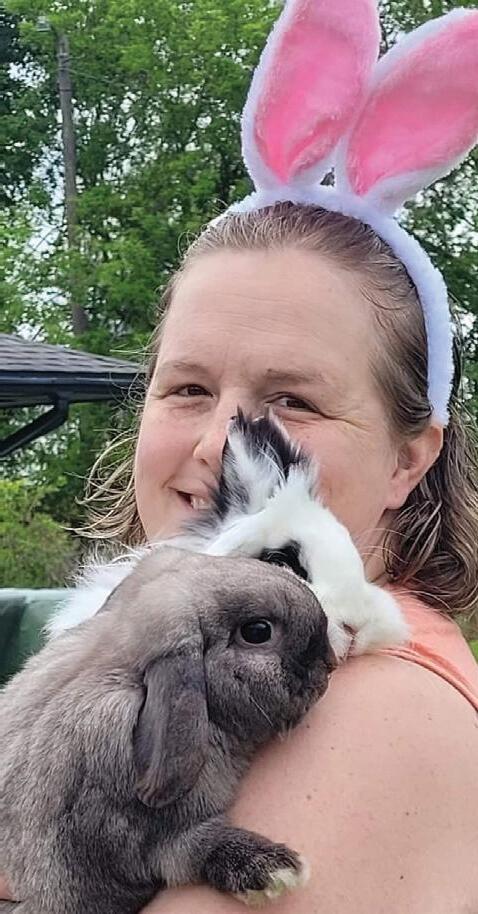
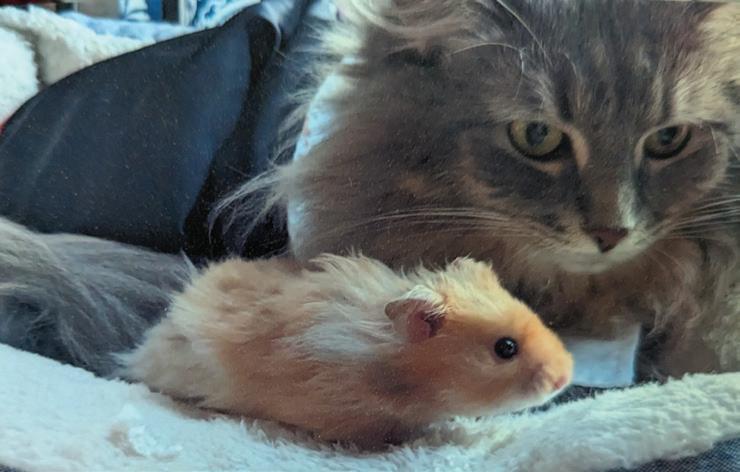
Rhody is my five-year-old Chow/ German Shepherd mix adopted from the Humane Society of North Texas. The training required because of her difficult temperament opened for me an entire world of dog people, who have broadened my life in totally unexpected ways. While I’ve spent the last six months undergoing chemotherapy for ovarian cancer, Rhody has been a loving companion. I serve as a volunteer photographer at dog nose work trials in the name of Alpha Delta Kappa, even though my girl and I don’t participate.
~ Lucy Kubo, TX Sigma

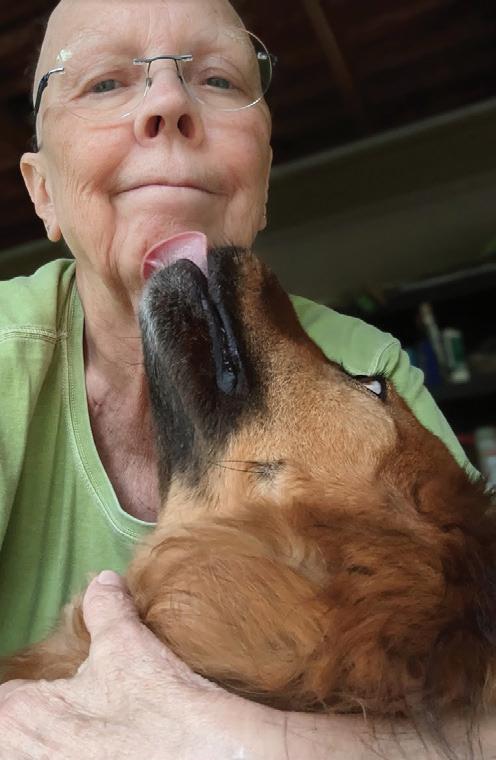
We have had “Old Steer” since he was a calf. He is gentle and loves to eat from a bucket! His horn span is just over 8 feet. We love having him as a pet and he loves having his neck rubbed!
~Judy Barnhill, TN Beta Zeta and “Old Steer”
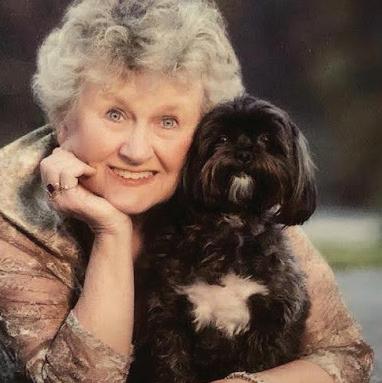
Molly was an owner surrender from Humane Society of Pulaski County in Arkansas. I was volunteering at the shelter and decided to go look at the small dogs that were up for adoption. I saw her in a crate and asked workers about her. They said she was female, housebroken and 7 years old. I took my current dog to the shelter to see if they would get along. They ignored each other so I took that as a sign from current fur baby, Maggie, that it was all good. While filling out her papers I looked at her info. We had that SAME birthday! It was meant to be.
~ Patty Snipes, Arkansas IPP, Alpha Chapter
We love rescue dogs from the shelter, which are usually a mixed breed of some type. In August 2020 we were lucky enough to find a shelter with a beautiful Blue Heeler/Retriever mix who rescued us as much as we rescued her. I named her Zuri, which means beautiful in Swahili, the foreign language I took as an adult student. Instincts of both breeds come out depending on the activity we do—she keeps us in sight and in line while hiking and loves playing fetch with a ball.
~ Claudia Moose, NC Sigma
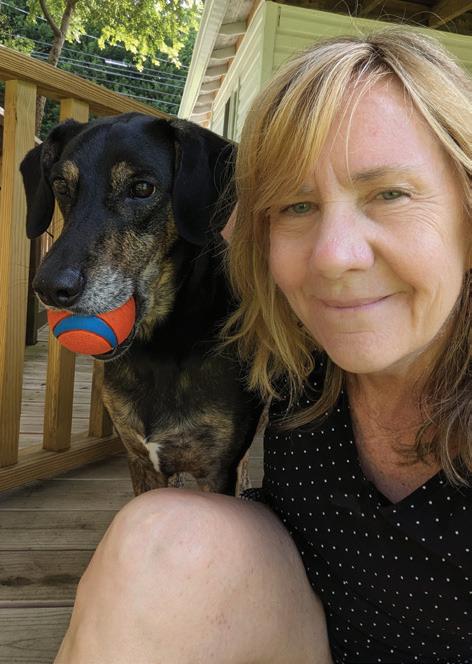

By Susan G. Pelchat, KAPPAN Writer, CT Mu
Following my initiation in December 1987, I received hard copies of the A∆K Handbook and the newly revised Alpha Delta Kappa International Bylaws from International Headquarters. I placed the documents on the hamper in the bathroom and studied them whenever I had time. There was plenty to study in those documents, and to this day, I remember key items that I learned in those early explorations: how to wear the badge, the criteria for membership and to which region my state belonged. These days, a new member would have to bring her computer to the powder room for equivalent learning sessions.
Over the years, the website has become a repository for vast amounts of information and has been difficult to search at times. But recently, reorganization has improved access. Though some may argue, to me, the most valuable components of the website are the directory and the resource library. My reasons are personal and practical.
Working frequently on the KAPPAN, I find that people may submit articles that require more information. To contact them, I go to the directory for their phone number or email. Sometimes, I need to find their S/P/N, current office, or chapter’s Greek name to properly acknowledge them as an article’s author. Sometimes, photos are insufficiently identified, and a directory search will provide the missing information.
Besides identifying people and their profile information, I use the directory when I have a query to send out to a specific group of sisters. For example, for this month’s KAPPAN article on members who first were veterans and later became teachers, I needed help connecting with a specific group of members. I exported a list of S/P/N presidents’ emails and sent out a request for qualifying members to contact for information. How I appreciate it when people take the time to help out.
And, of course, the directory is invaluable when I need to send personal communications like notes to those who have made a difference in my life. Mailing addresses are available for each member in the directory, which makes short work of mailing thank yous. I used to tell people, “I live in the directory,” and with my KAPPAN work, that’s not far from the truth.
Reading remarks and queries in A∆K CONNECT, I frequently comment confidentially to my computer screen, “That’s in the Resource Library.” Where can I find the form to submit
the name of a new member? To whom do I send a scholarship application? When are dues due? What is the timeline for the Excellence in Education process in even-numbered years? So many questions can be answered in the resource library, but it’s best not to wait until one needs an answer to explore and understand the library’s groupings, which are fairly comprehensive and self-explanatory. Once a person explores what is available, they’ll realize the logic and straightforward nature of the site’s organization.
Under each topic, sub-headings detail what is included. By taking a few minutes to examine the structure, one realizes how complete the information is. The breakdowns follow.
Guiding Documents (strategic plan, style sheet, protocol, A∆K guiding principles, IRS, maps)
Governance Documents: Constitution, Bylaws, Policies and Procedures
International Standing Committees, Boards and Other Committees
All Members
Member Documents and Forms
A∆K History
Membership Materials
Chapter Officers
Chapter Guiding Documents
Chapter Training Tools
Chapter Documents and Forms/ Financial Forms
S/P/N Officers
S/P/N Guiding Documents
S/P/N Training Tools
S/P/N Documents and Forms/ Financial Forms
International and Regional Officers
International Documents and Forms
Regional Documents and Forms
Convention and Conference Planning
Foundation Documents and Policies
Foundation Guiding Policies
Foundation Documents and Forms
Scholarships and Grants
on next page
Sergeant-at-Arms is an optional office, although many states still have one. Here in New Jersey, I served during the last biennium. My job was to start each meeting with the Pledge of Allegiance and the singing of “The Star Spangled Banner.” At the NJ State Convention, I had the attendees wait and enter silently for the Omega service. I also brought the state banner to each function and provided name plates for the head table. I wondered what sisters in other states who also held this position did. Here is what I learned.
Dee Elder of Missouri said that Kathy Kollmeyer was her excellent Sergeant-atArms (SAA) “It was Kathy’s job to make sure the correct board members were at the head table during each business session as well as getting everyone lined up for the opening procession. She was great.”
rounding up sisters who were to speak, having them in place so no time was wasted. It seemed like she was running everywhere with little tasks and messages. She will be a hard act to follow.”
Valerie Snell, North Carolina State President, wrote, “The Sergeant-at-Arms for NC for 2022-2024 was Frances Wilson. Our newly installed SAA is Carol Harper.” Valerie cited the SAA’s duties from the “NC Policies and Procedures Manual.” The duties include assisting in coordinating the activities of state meetings in such a manner that there will be harmonious functioning at all times and standing ready to assist the state president as the need arises.
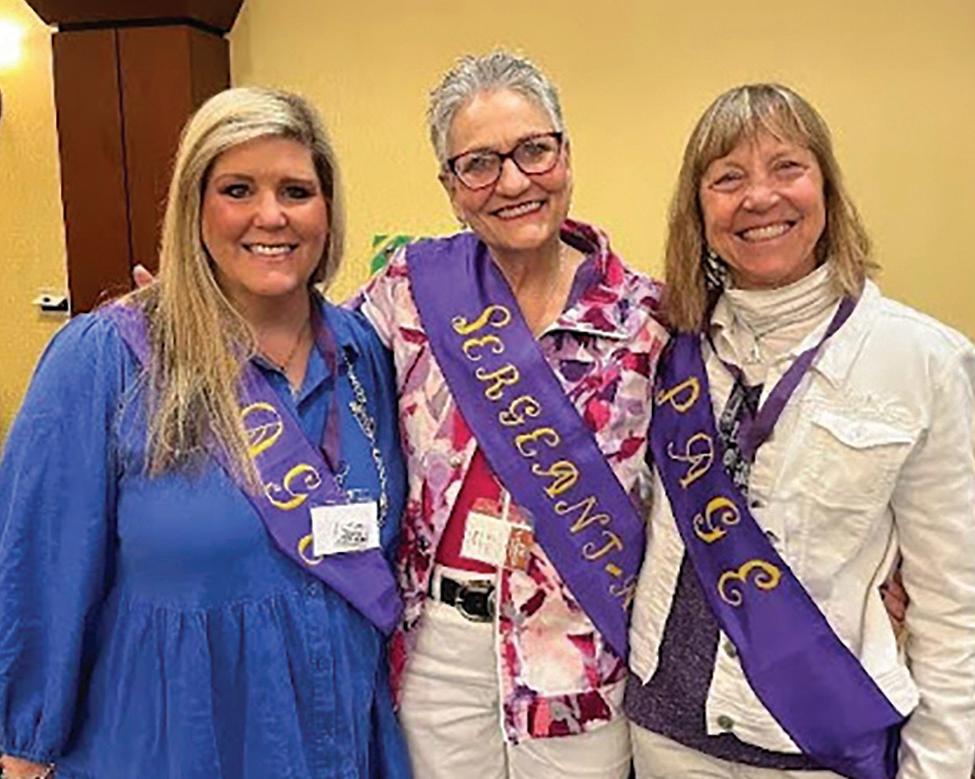
WA Immediate Past President Mary Jo Heller, said. “Our 2022-24 Sergeant-at-Arms was Diane Fabish, who was fabulous. She created name tags for our board, including elected board members, chairs of committees, district presidents, and presidents of chapters, all of whom were invited to be at our board meetings. Diane was also a liaison for one of the chapters, and supplied them with a recap of the board meeting. She also attended several chapter meetings as the State Board representative. Diane researched her role specifically for the state convention, finding and setting up the order of the board with name tags. She created a group of assistants and instructed them on a wide variety of tasks, from greeting outside speakers and escorting them in and out of the ballroom to
Tutorials
Tip Sheets
Videos
Want to broaden your members’ understanding of our Resource Library? Present the outline to members during the Fraternity Education portion of a meeting and ask where they might find specific types of information. Here are ten questions for your first fraternity education session:
1) Where would a chapter treasurer look for financial forms?
2) When writing an article for the KAPPAN, should the word “sisters” be capitalized?
3) You’d like to attend the conference of a friend in Wyoming. How would you discover to which region she belongs?
4) What are some ways chapter officers might share leadership positions?
5) What are the requirements for filing S/P/N altruistic forms?
Linda Rissel, NJ Lambda, took on the task of organizing and leading the army of SAAs at the International Convention in Kansas City in July 2023. Linda strongly feels that the members who serve in that capacity play an essential role in the smooth functioning of a meeting. She says that organization on the part of the lead SAA is critical. In Kansas City, Linda organized teams and took care to schedule the volunteers so they were free to attend Symposium sessions. She made certain that the SAAs had information about room locations, starting times and the nearest restroom so they could be of assistance to the attendees.
Although being an SAA may be hard on the feet, it does come with a distinctive sash and an excellent way to meet new sisters. Susan Whelan, NJ Kappa and KAPPAN writer contributed to this article.
6) Our state wants to charter a chapter. Are there any ceremonies we can use as models?
7) I’m thinking of offering for regional president-elect, but I first want to know what would be expected of me. Where can I find that information?
8) Is there a video tutorial on driving Alpha Delta Kappa sisters named Miss Daisy?
9) I don’t know how to update my profile. Are there any tips in the resource library for how to do that?
10) I’d like to share information about our scholarships with prospective members. Where can I find all scholarships listed in one document?
Many questions can be developed related to the Resource Library contents. Practice using the outline to help members become more conversant about what is included there, and expand their knowledge of our organization at the same time. Before long, you will have the best-informed members in Alpha Delta Kappa.
By Leadership Academy Board Member Emily Castillo, VA Alpha Omicron
As I ponder what to write, I see 5-year-old hands poking through the bottom of the door. Soon comes his famous question, “Do you remember when…?” Tonight, he wants to know if I remember that time I wasn’t at home, and it rained. He was very confused that I did not remember. Guess I won’t have a moment tonight to write this article.
In A∆K I often get a lot of attention bringing my son, Edward, to meetings and conventions. Most of the time it is positive and almost every time I am asked how and why I do it. My answer is typically, “I have to.” My schedule and my husband’s schedule do not always align, and my mom and best friend are in A∆K, so I can’t just simply drop him off. I also want him to benefit from seeing me, and many other strong women, be leaders. As teacher-moms have for decades, we do what we have to do and what is best for our current situation.
Current teacher-moms are pulled and stretched while being smiled at and asked if they can do just one more thing. This isn’t new. I grew up watching my own teacher-mom being tugged and pulled. Like her, we all do what we feel is best for our families and our students. I feel the difference between back then and now is the access parents have to teachers. I am pretty great at setting boundaries and saying “no,” but that doesn’t stop parents from emailing at all hours or even following me into a store and demanding a meeting while I shop for shampoo (true story, and her son was absent that day). There are so many apps teachers are required to use that give those parents what feels like unlimited access to teachers. Even though boundaries are often crossed, they need to be set. Being a teacher-mom in 2024 means there will be emails missed, papers to be graded constantly (or recycled), every day either my son or my students will get less of my energy, and my friends may think I forgot about them. Many teachers feel drained by all the extras in the classroom and even a beloved hobby can feel like extra work. It is incredibly hard to balance the daily needs, like dishes, dinner, and rest with the social needs, like A∆K, friends and hobbies.
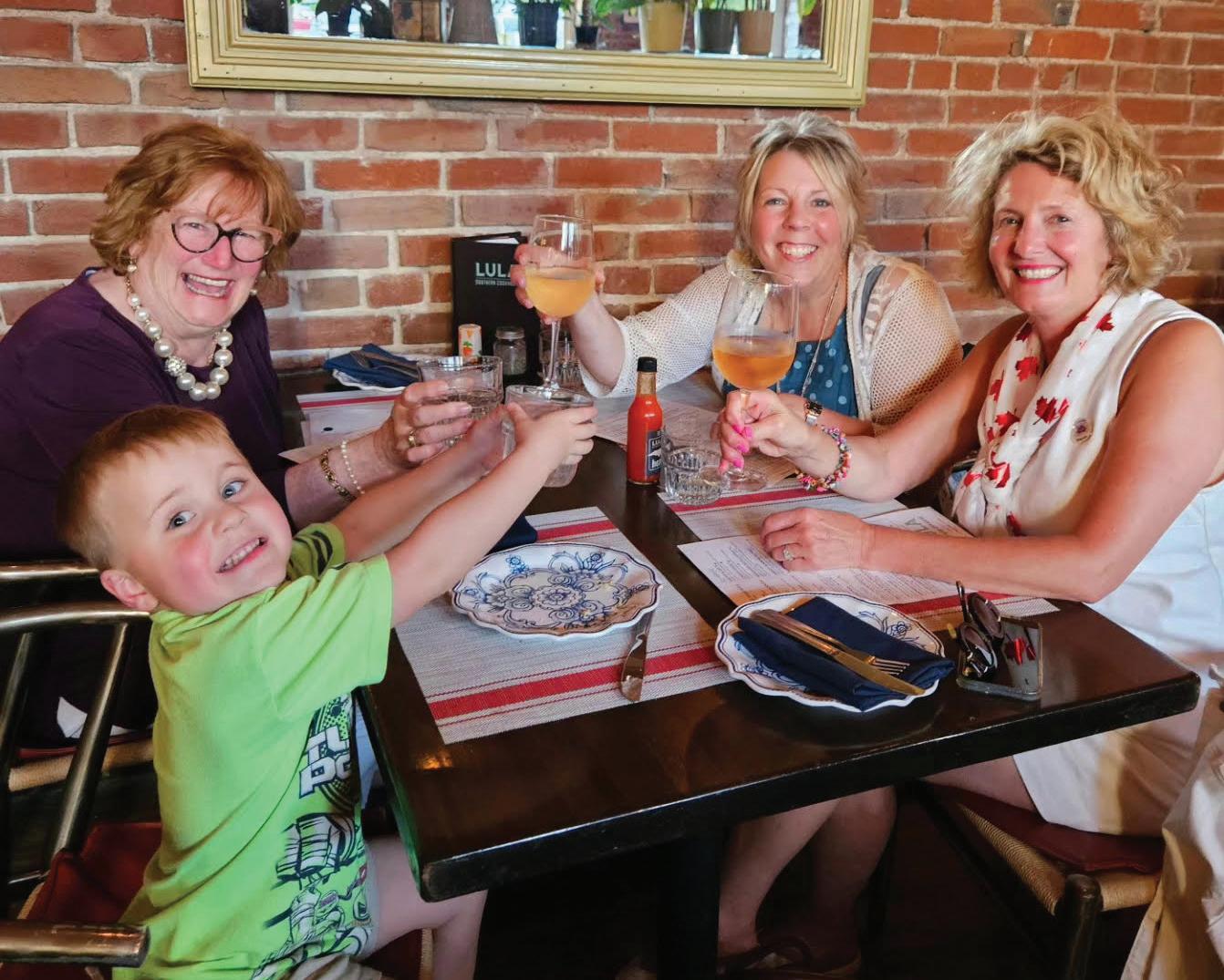
You must find a support system, and A∆K can be that. The first time I felt seen as a working mom in A∆K was at the NCR conference in 2022 because the registration form asked how old my guest was, and I was able to pay a more appropriate rate for a child meal. If you were in attendance, you likely saw our sisters from Canada with a giant bag of fun activities and a cute little blonde boy bouncing around them. They made arrangements to watch my son while I presented and enjoyed the conference. You likely saw this repeated at the Kansas City International Convention in 2023 where even the Keynote speaker took a turn playing with him. If you attend an event with Virginia sisters present you likely won’t even see Edward with me. He will be engaged with a sister coloring, cutting up on the dance floor, having a dinner date, or volunteering at the registration desk. When you register for a Virginia convention, you are asked if you need child care. It is such a relief to know my son is welcome in something I am proud to be a member of. Alpha Delta Kappa needs to adapt to move forward. If we want new, younger members, then we need to meet them where they are and many of them want to be engaged with their own children doing what they love. Something as small as inviting the children to come to a meeting will help that teacher-mom feel welcomed. She may turn you down, but keep offering. Build trust with sisters, and engage with their children by showing interest in them. Rachel Shankles, a sapphire sister, remembers feeling trusted by her sisters in her time of need, and now, her chapter gives back to their active educators by hosting a teacher shower with items purchased from Amazon Wishlist. Ontario President Marg Nieradka knows there is an ebb and flow with membership, and sisters can always step forward when ready for leadership or step back while still making connections with the chapter. Teacher moms and active educators want to be in A∆K but the current demands on teachers make it hard to juggle. We can support them by being understanding of their needs, talking to them about what they want, and including them on a level best for them.
By Gwen Steele, KAPPAN correspondent
Look at the calendar. It’s almost that time again. Time to remember and celebrate Alpha Delta Kappa’s Founders.
In 1947, Agnes Shipman Robertson, Marie Neal, Marion Southall and Hattie Poppino realized their collective vision of establishing a women’s fraternity of teachers whose mission was to grow camaraderie among its members, promote education and serve the community through altruistic endeavors. As a worldwide organization, we celebrate their legacy yearly in October with Founders’ Day celebrations. Programs can be simple or elaborate, short or long. What does your chapter do? Do you find yourself in a bit of a rut, repeating the same celebration with perhaps little variation year to year? Do you rack your brain for new ideas? It’s not unlike falling into the lesson-planning rut, too, don’t you think? Well, you’re not alone. How about using one of the ideas below in your October meeting this fall:
• Share a retrospective timeline of your chapter’s history to celebrate our organization and the chapter.
• Recognize sisters’ special A∆K anniversaries. Ask them to share why they joined and why they remain a member today.
• Ask sisters to dress in violet, green, or yellow and bring a gift under $10 in that color. To win the prizes, play a game, perhaps bingo. Ideas: violet-handled kitchen scissors, lemon-scented candle, and Andes green mints.
• Conduct initiations and reinstatements or remember those who have entered the Omega chapter, all while celebrating the history and continuance of A∆K.
• Use the KAPPAN Special Edition Commemorative issue, page 2, to highlight Agnes’s recruiting philosophy speech, which shows recruitment as a priority even in early A∆K history.
• Design and play group trivia, focusing on Founders’ facts trivia or decade trivia from the 1948 era.
• Offer an “Autumn of Change” program: scatter colorful leaves and display leaf-shaped cookie cutters. The message is that from the founders’ days through today, our “leaves” have changed to see our mission clearly, expand our mission, and show the warmth of sisterhood through their colors. Falling leaves remind us to stay connected, regardless of the changes we experience. Serve leaf-shaped sugar cookies.
• Ask members to bring a $5 item beginning with A or D or K. Read a story with two “magic” words. Each time one phrase is read, pass your gift to the left or to the right when the other phrase is read. Players keep the gift they hold at
the game’s end. It’s a great way for sisters to learn A∆K history along the way.
• Play “What’s My Line?’ For a 5-10-minute round, prepare a script featuring information about Agnes Shipman Robertson. Choose two contestants, one Agnes and one imposter. The moderator asks scripted questions. The audience votes for the “real” Agnes. Thanks to Ivette Bender, NE Theta for this idea.
• Honor the past by sending invitations to your chapter’s past presidents to attend the Founders’ Day meeting. Present each with a certificate listing their name and the dates served in that office. See A∆K supplies for certificates.
• Celebrate with a sister chapter, meeting for lunch or dinner. Share chapter history.
• Set tables with a framed picture of one of the Founders. When the Founder is mentioned, someone at that table raises the picture while the speaker provides that Founder’s original job description. To add to the fun, the speaker wearing a period costume of sorts then asks the audience to compare her attire with that of the profiled founder. Laughter about hairstyles, pearls, white gloves and dress style is sure to follow.
• Serve birthday cake and sing “Happy Birthday to A∆K” before eating it.


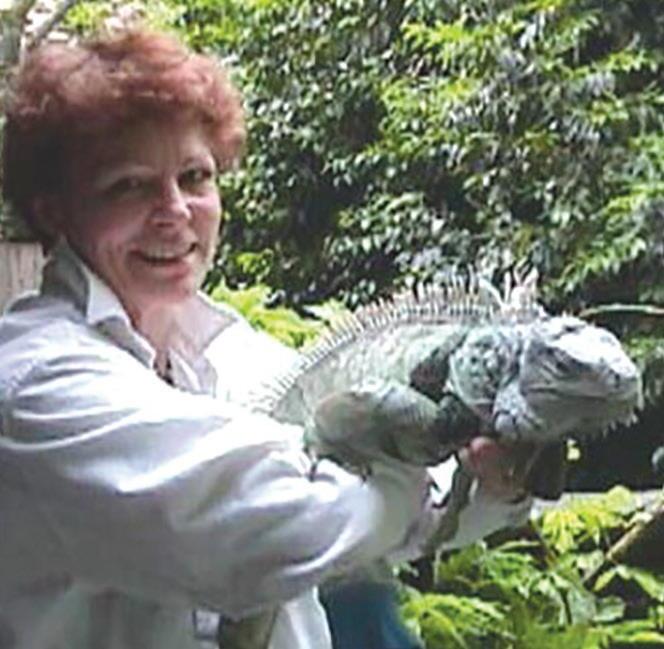
Beware what pets your children bring home. My daughter Dana, while in college, received an iguana as a pet from her then-boyfriend. When they broke up, the iguana became mine and lived for 12 years in a 5’ x 5’ cage in our living room. He grew to be four feet long (mostly tail) and liked to sit on my shoulder or on the deck. He was able to walk from his cage to the downstairs shower during the winter to “potty.” We now have a new “Iguana Memorial Chair” in that corner.
~Mary Jo Heller, WA Alpha Delta
By Julie Kinder-McMillan, KAPPAN Correspondent
Having multiple members of the same family join Alpha Delta Kappa is not very unusual. Many chapters have mother/daughter pairs or biological sisters. However, the Tennessee Beta Chapter can boast something a bit more rare: four generations of one family.
The tradition began with Dr. Elizabeth Landress Dalton. Dalton taught for decades in Chattanooga public schools before earning her Ph.D. from Peabody and going on to instruct pre-service teachers as a professor at the University of Chattanooga (now the University of Tennessee at Chattanooga). TN Beta was formed in 1955, and Dalton joined in 1956.
Dalton worked as a teacher through World War II and raised four children while working full-time as an educator. After an entire career in the classroom, she earned her Ph.D. by driving to Nashville for Saturday classes and staying with friends and family during the week for a nine-month residency on campus.
“The same year I graduated from college and my brother graduated from high school, my mother graduated with her Ph.D.,” said Dalton’s daughter Barbara Warner. “When she made up her mind, she could get things done!”
“I was very pleased when my daughter Elizabeth joined the chapter because I thought, ‘We’re starting a great tradition here,’” Warner stated.
Even though Stewart did not become a member until 2015, she recalls “tagging along” as a young child to Alpha Delta Kappa meetings with her mother and grandmother. She remembers going to the Christmas tea at a church in downtown Chattanooga in the 1970s and enjoying the special treats and warm fellowship of the TN Beta sisters.
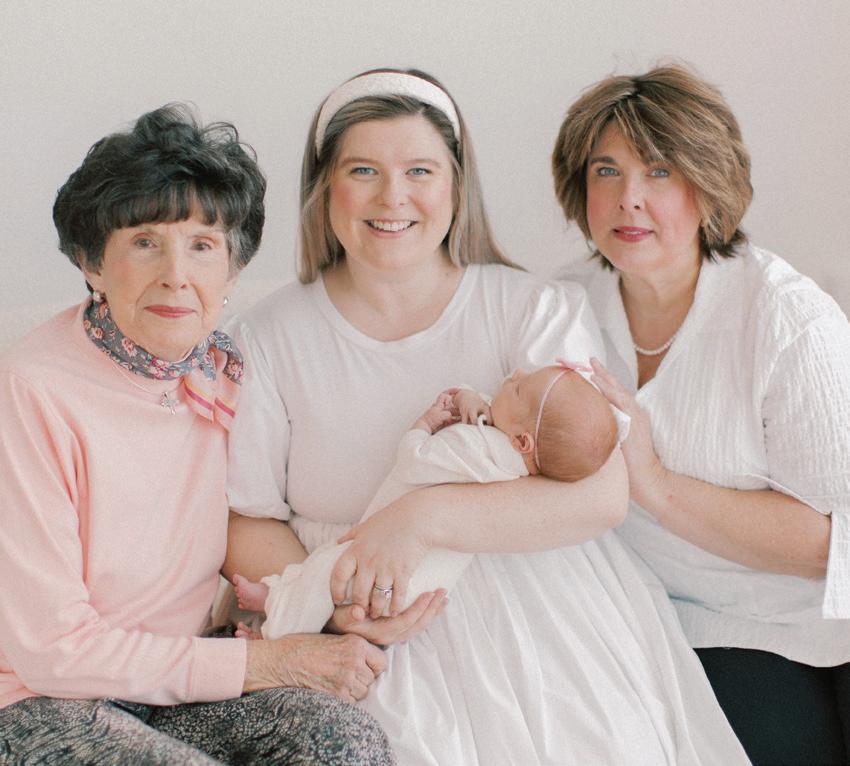
Of joining the chapter alongside her mother, Warner commented, “Well, they knew how talented my mother was, and I guess they thought, ‘We’d better grab another one.’” Warner, who taught English and history in Chattanooga-area high schools, joined in 1967.
“Being together in the chapter was very interesting,” Warner stated. “We had to behave ourselves and keep each other in line,” she joked. On a more serious note, she shared, “Observing my mother interacting and leading a group like that allowed me to see her in a different light.” Warner has been a chapter leader in her own right, having served twice as chapter president. Warner is now a Golden Sister and many of those years were spent in sisterhood alongside her mother until Dalton joined the Omega Chapter in 1995. Warner’s sister, Anna Dalton Overend was also briefly a member of the chapter.
Elizabeth Stewart continued the family tradition when she joined TN Beta in 2015. She began a second career teaching middle school Algebra and math in 2011 and has enjoyed bonding with her mother and later her daughter through membership in Alpha Delta Kappa. They co-host the chapter’s Christmas party at Stewart’s home.
Stewart’s daughter, Mary Landress Stewart Hewatt is the fourth generation. She joined TN Beta in 2020. Hewatt has taught elementary school, mostly Kindergarten, for the past six years in Chattanooga and will teach pre-K in the upcoming school year near her new home in the Atlanta, GA, area.
“Because I’ve always been a very sentimental person, carrying on this tradition is very much a privilege,” Hewatt shared. “My great-grandmother was influential in a lot of educators’ lives in the Chattanooga area, and I share her maiden name as my middle name. We could not go to the grocery store in our community without a former student happily greeting my grandmother (Warner) or running into someone in professional circles who reminisced about my great-grandmother’s impact in the classroom as a teacher and professor of education. As the only great-grandchild (at the age of six months) to have met her before her passing, I feel a responsibility to carry her legacy forward.”
Hewatt recalled watching her grandmother grade papers on the weekends and seeing her mother fulfill “room mother” responsibilities during her own school years. The family is close-knit and being together in Alpha Delta Kappa has provided a way for the women to spend even more time together.
“I didn’t necessarily become a teacher just because of my family, but carrying on this tradition has been absolutely incredible. I’m thankful for my family’s influence on me and this chance to spend extra time with them as members of the same organization. Very few people can say they have carried on a tradition like this,” Hewatt said. Sisterhood bonds are strong with these ladies as they are all first-born daughters who are also members of the Pi Beta Phi collegiate sorority.
Although Hewatt recently moved three hours away because
Continued on next page
By Betty Sherrod, KAPPAN writer
When she was in high school, Kelly Meade attended CA Zeta meetings with her mother Monica Meade, as her mother’s helper. She assisted with scholarship teas and any other tasks her mother volunteered to complete. Often, she traveled with her mother to A∆K conventions, conferences and local events. When her mother joined the CA State Board, Kelly went with her. After completing high school, Kelly’s goals included attending the University of Washington (UW), becoming a member of the rowing team, receiving a scholarship and majoring in chemical engineering. She achieved all of these goals. Teaching was not one of them.
At UW, Kelly changed her major a few times. Her father, wondering when she would finish, said, “Okay Kelly, you need to graduate.” During her senior year, she entered an interdisciplinary studies program, taking on the challenge of designing her own program which she called Adolescent Social Behavior. She mentored students in grades 7-12 and found great enjoyment in interacting with teens. She moved back home to Long Beach, CA after graduation and began to substitute teach short-term, and then long-term assignments. During this time, Kelly began to ponder a career in the medical field and, four years after leaving UW, she obtained a Master’s degree in Health Administration from the University of Phoenix, Fountain Valley, CA.
At UW, she had made a pact with a friend, saying, “I’ll meet you wherever you are.” Her friend had joined the Peace Corps, so Kelly took a two-month leave of absence and traveled to Uganda. There, she volunteered at the Kabwohe Clinical Research Center teaching life skills and health education to girls at the Kashaka School. It was during her time there she decided, ”I need to teach.”
In 2010, she graduated from California State University, Long Beach, certified to teach Earth Science. After obtaining credentials in various sciences, she now teaches Medical Chemistry, Epidemiology and Public Health, and Environmental Geoscience at Jordan High School in Long Beach.
In 2017, she applied to become a National Geographic Society Grosvenor Teacher Fellow and National Geographic Explorer and was accepted. Kelly said, “I’m an explorer anyway.
of her husband’s new job, she intends to remain a member of TN Beta. In fact, her eight-month-old daughter Anna Wells Hewatt is already joining in the family tradition.
“Anna has attended several Beta chapter meetings,” Hewatt said. “An Alpha Delta Kappa meeting was one of her first outings, and she loved it. She went to a garden meeting at a local nursery, and she was
As a child, we were always outside, walking, camping, and taking road trips.” Now, Meade shares her expeditions with her students who may not have access to the resources needed for traveling. She keeps two globes in her classroom and often asks her students, “Where do you want to go?” One of her goals is to instill that sense of passion for exploration that she has held all of her life.
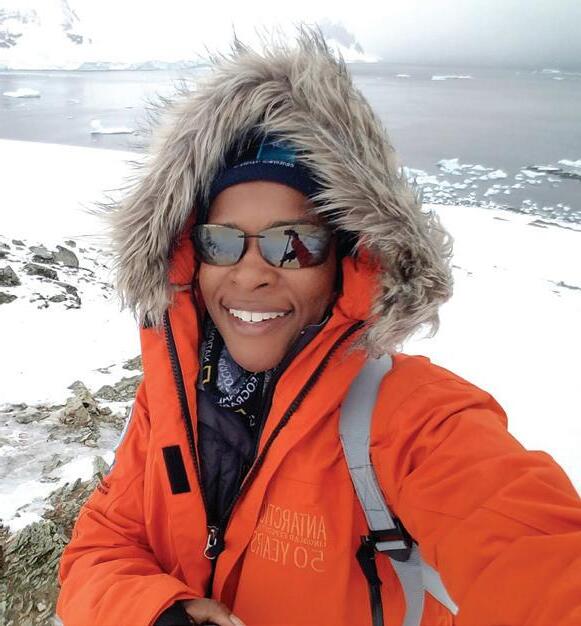
National Geographic Educator Explorers may suggest the countries they would like to visit but often are sent elsewhere. Kelly was thrilled to complete two expeditions, one to Antarctica and one to the Galápagos Islands. In Antarctica, her students joined her digitally and decided they wanted to help by fundraising and “Walking for Water.” For an hour, each student carried 2 gallons of water around the school track. This activity simulated the daily task faced by millions who have limited access to water.
When Kelly returned from Antarctica, she wrote a curriculum called “The Value of Water” to use in her classroom. In the Galápagos Islands, she helped graduate students with “EcoBlitz,” a program that assesses the biodiversity of a community. Data about the litter found there is then collected and comparisons are made that help to define human impact on the environment.
Kelly was initiated into CA Zeta in 2011 and currently serves as chapter president. Her CA Zeta sister, Susan Blough, said, “Kelly epitomizes the mission of A∆K. A true Renaissance woman, she can do it all. Tech savvy, she handles chapter and state tasks with great effi ciency, including a very long list for Zeta’s scholarship tea. She balances it all with continuing dedication to her high school Medical Chemistry and Public Health students and support for her mom. We are so incredibly proud of her accomplishments and feel so lucky to have her as a member.”
very into seeing all the people and the colorful flowers.”
Only time will tell whether Anna will also become a teacher and one day carry this tradition on to the fifth generation.
Do you have a unique story in your chapter we could feature in the KAPPAN? Please submit suggestions to Julie Kinder-McMillan at jujumkinder@gmail.com.
for Service to the Cross Keys Schoolhouse by the CSAA
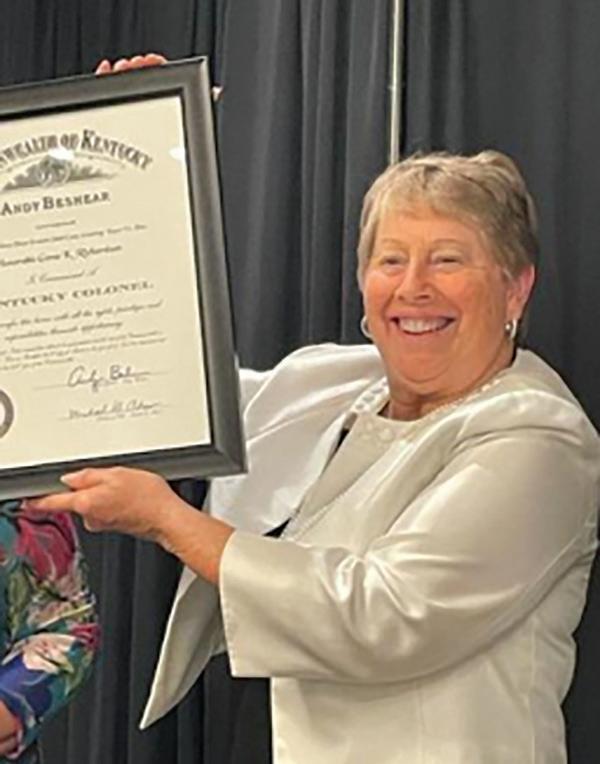
Gena Richardson, KY State President 2022-2024, received the Kentucky Colonel Award at the recent state convention. The Commonwealth of Kentucky awards this highest honor to individuals who have contributed to the community, state, or nation or for extraordinary achievements. Kentucky Governor Andy Beshear presented it in the name of the Commonwealth. Gena is a Violet sister and a member of KY Kappa.
Rosalind Burns, a member of TX Epsilon Sigma chapter in North Harris County, TX, and principal of AW Jones Primary School, was recently named Principal of the Year for Aldine Independent School District.
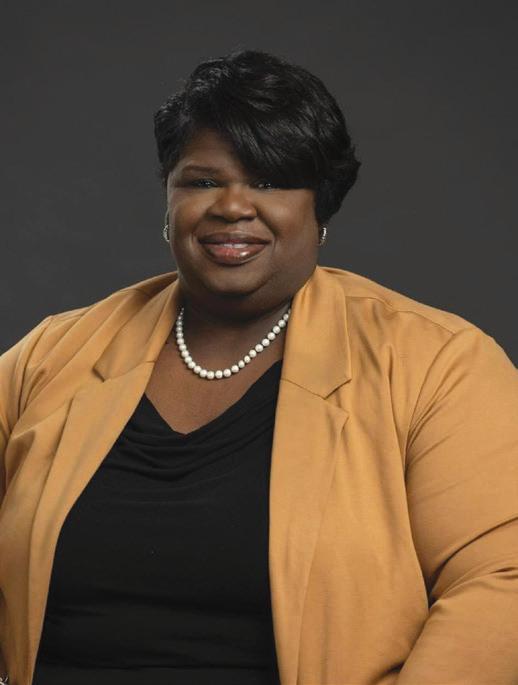
Rosalind was also one of five principals in Texas named a Texas Black Expo (TBE) Outstanding Principal Honoree. The award recognized Rosalind for her leadership in school administration and her outstanding impact on students. The TBE recognizes outstanding educators for “their impact, innovation, and influence in their school systems and beyond.” TBE’s aim is to attract entrepreneurs, corporate giants, civic leaders, celebrities and families to strengthen and empower the community.
During her thirty years in education, Rosalind has been named Teacher of the Year in Aldine and the Black Educator of the Year by the Houston Area Alliance of Black School Educators. In whatever position she has held, she says she has always aimed for excellence in everything. As a principal, she considers having good relationships with both staff and parents paramount. She emphasizes letting students know they can achieve in everything they do and that they don’t have to be perfect in everything but rather, they should do their best in every endeavor. She says that having high expectations of her staff trickles down to the students and their parents.
Rosalind has been a member of A∆K for five years. Her sister, Freda Wells, is also a member of TX Epsilon Sigma.
Article submitted by TX Epsilon Sigma President Jeanette Reyenga.
Patricia Alvino, NJ Alpha Alpha, received the 2024 Country School Association of America’s Service Award for her devotion and commitment to the Cross Keys One-Room Schoolhouse in Medford, NJ. The Association commends her service in creating a living history program for the students of Medford while advancing the history of our nation’s first schools. The Service Award, which includes an honorarium of $300 and a certificate of appreciation, will be presented at the annual CSAA Conference in Toledo, Ohio.
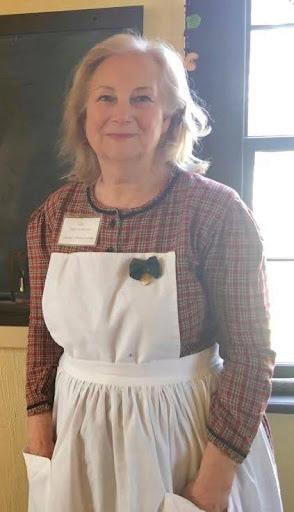
The Country School Association of America is a non-profit national organization dedicated to preserving memories of country schools and promoting scholarship about the early American education experience.
The Cross Keys One-Room Schoolhouse is maintained and staffed by the Medford Historical Society.
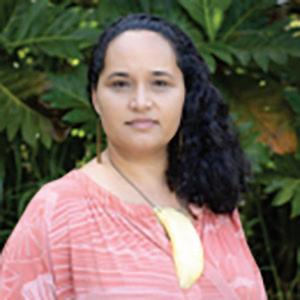
Puni Jackson was elected at the Hawaii State Convention as an honorary member of A∆K.
Puni is a Native Hawaiian cultural practitioner who has led endeavors in Hawaiian cultural and ‘āina (land)-based educational programming for over twenty years. She is a respected and experienced practitioner of lā’au lāpa’au (traditional Native Hawaiian medical practice) and other Native Hawaiian healing arts, including cultural practices around childbirth. In addition, as an accomplished kanaka maoli (indigenous) artist, she is known primarily for her large-scale painting and installation work.
Puni has been instrumental in establishing Ho’oulu ‘Āina as a healing refuge for the community and Native Hawaiian cultural practitioners. Ho’oulu ‘Āina is a 100-acre nature preserve located in Kalihi Valley on the island of Oahu. It is cared for by Kōkua Kalihi Valley Comprehensive Family Services, a nonprofit community health center, and a federally qualified health center. Ho’oulu ‘Āina is the only large-scale nature preserve within the urban core in the City and County of Honolulu. Puni has developed programs at Ho’oulu ‘Āina that establish a reciprocal relationship between the land’s health and the people’s health.
“Puni has used her commitment, knowledge and skills to bring community members together to reconnect to the land, to their health, to themselves and to each other,” according to HI State Honorary Committee Co-chair Claudia Kobayashi.





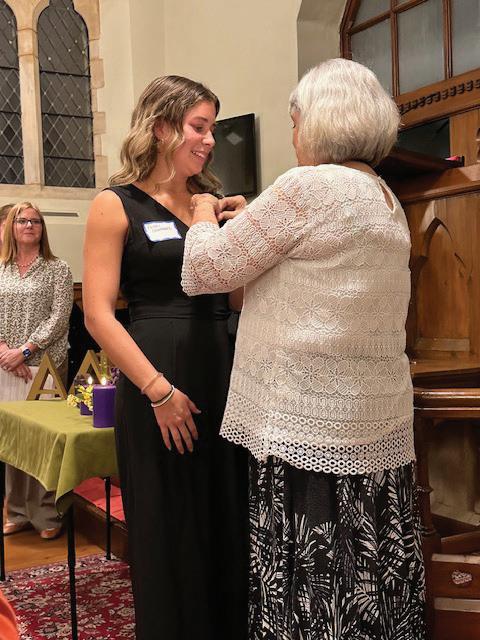




he members of the Alpha Delta Kappa Collegiate Clubs (A∆KCC) are back on campus and ready for another year of activities. The Baker University club plans to continue altruistic projects to provide supplies for teachers in Baldwin, KS, schools. Last year, the club held a bake sale, with proceeds going to school supplies and the leftover baked goods donated to the unhoused of Lawrence, KS. Taking a line dancing class with members of IN Beta Epsilon is on the agenda for the Ball State Collegiate Club.
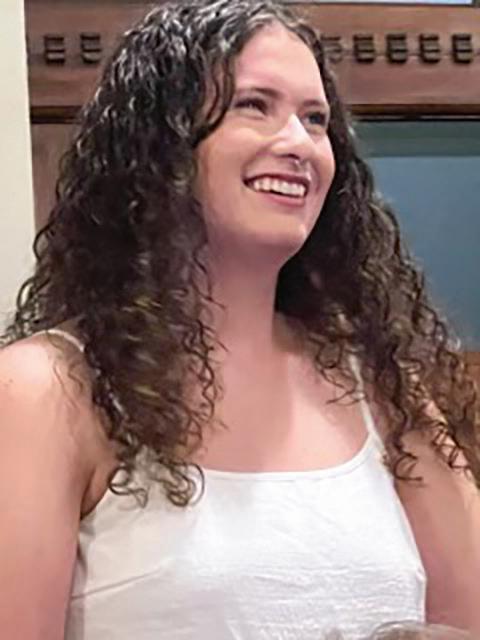






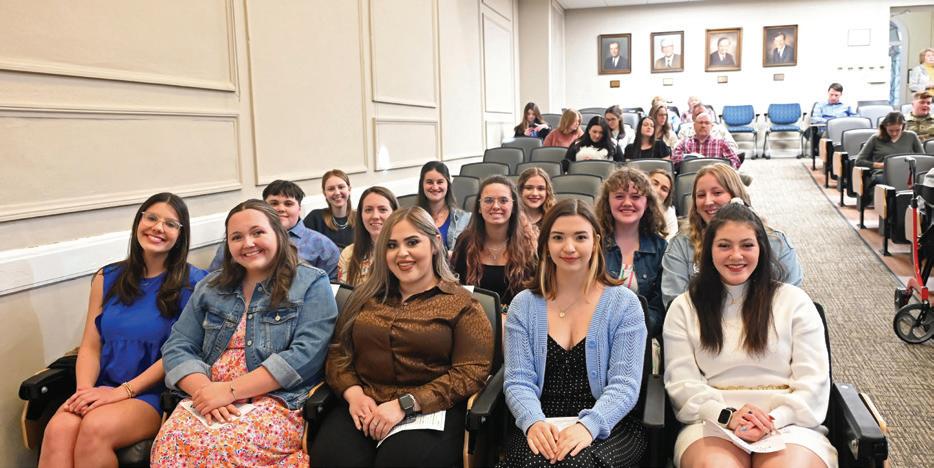
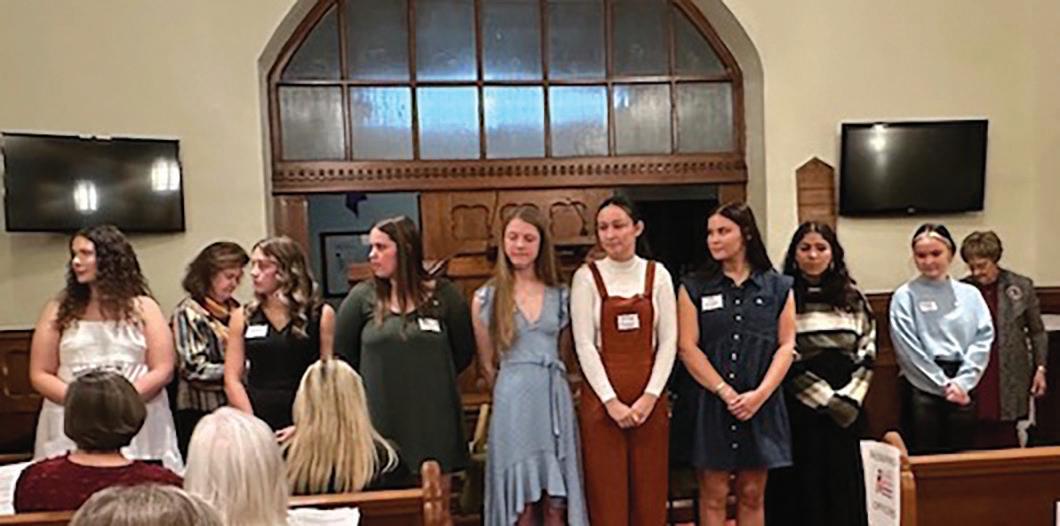

Similar plans for connecting with their communities and with their Alpha Delta Kappa sponsors are underway in other A∆KCCs.
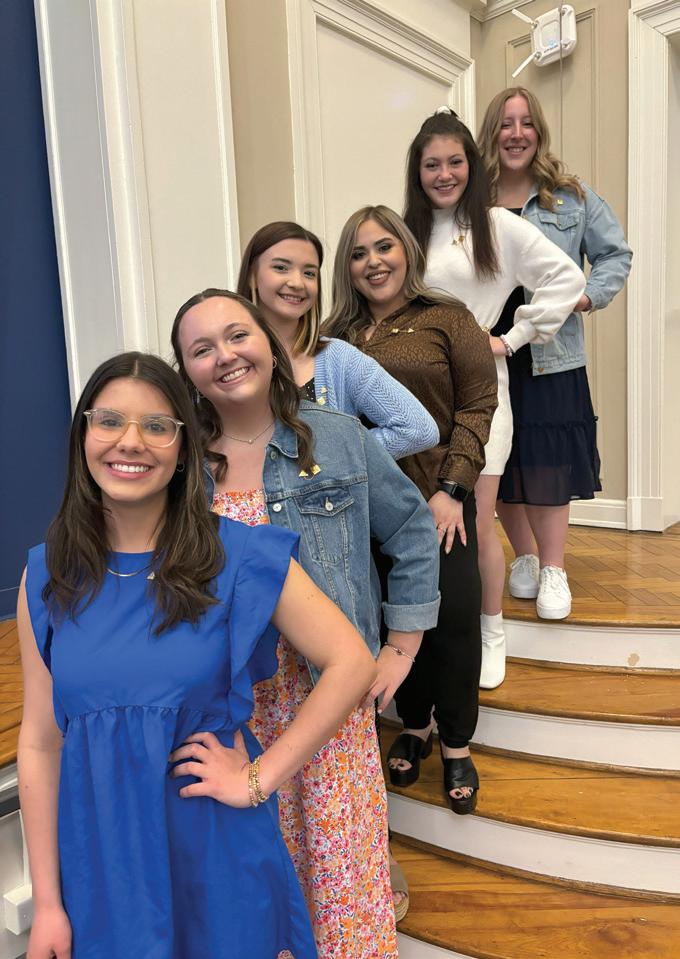




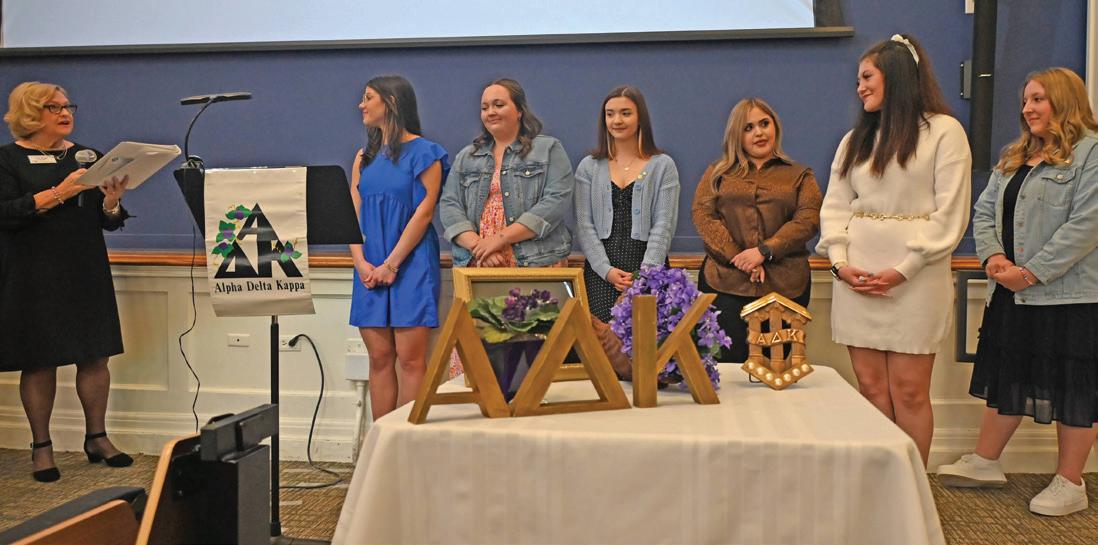

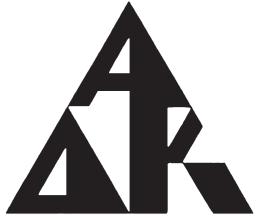
“Around the world, members combine their energies and talents to enrich their lives and the lives of others through thousands of heart-warming community based altruistic projects. Because of these projects, it is a brighter day…” ~Alpha Delta Kappa Handbook
AL Beta Xi sisters made a splash by donating swimsuits, towels and making a monetary contribution to the BigHouse Foundation in support of its “Swimsuits & Towels” project. The donations gave adopted and foster care children their own monogrammed towels and bathing suits for enjoying summertime activities. Sisters also toured the BigHouse’s impressive twostory facility, a sprawling 8976 square feet dedicated to fostering a sense of belonging in children in need. The BigHouse Foundation was founded in 2009 as the dream of two college students to positively impact the world of foster care. It focuses on serving foster and adoptive families by providing resources and building relationships.
The chapter recently awarded $1,000 scholarships to three high school seniors. The recipients are Ella Thames, Lee-Scott Academy, who plans to attend Auburn University, and Lilliana Aleman and Hannah Huling from Opelika High School. Lilliana will attend Southern Union Community College, and Hannah plans to attend Auburn University.
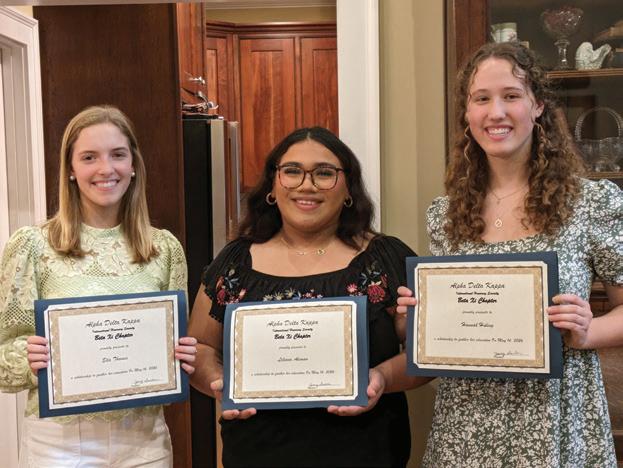
The chapter was able to award an additional scholarship this year due to the success of its annual “Taste of Chocolate” scholarship fundraiser held in February.
Recipients of the AL Beta Xi scholarships (L to R) Ella Thames, Lilliana Aleman and Hannah Huling display their scholarship certificates.

FL Delta Kappa celebrated the end of the year with a dinner and the award of a $500 scholarship to a local high school student. The sisters also distributed gift cards to Andrew Williams and Holmes County EMS, along with a letter of encouragement and information about A∆K.
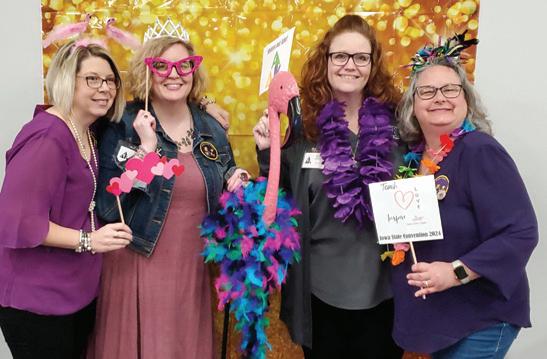
Sisters attending the Iowa State Convention this spring in Johnston, IA, donated $1,300 to the Stead Family Children’s Hospital, raised money for the state’s disaster relief fund, initiated new state officers and found time to have their picture taken with Angus, the Flamingo. Posing with Angus are (L to R) Brandi Craig, Megan Steahr, Teresa Heitmeier and Beth Orth.
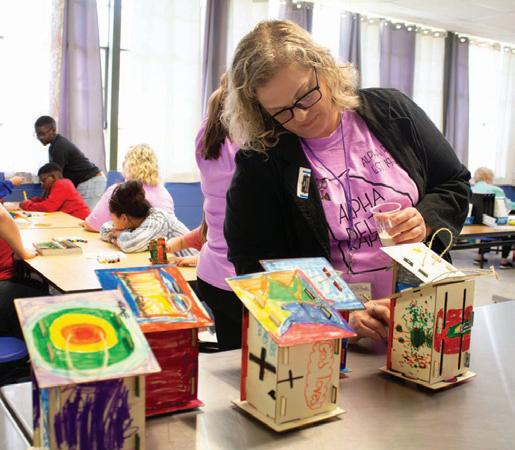
Laura Howard, GA Alpha Rho member, looks at a few of the 24 butterfly houses the chapter sisters, in partnership with the local Boys and Girls Club, created to display around Cook County. The sisters’ work to create the butterfly houses was a celebration of the life of Past Chapter President Pat Bush who joined Omega. Pat joined Alpha Rho in 1987 and served as president, presidentelect, chairman of the Albany District and on several state committees. According to Alpha Rho President Mandy Ward, the project was “to honor Pat for the influence she had on everyone she met.” Pat was instrumental in bringing the Boys and Girls Club to Cook County.
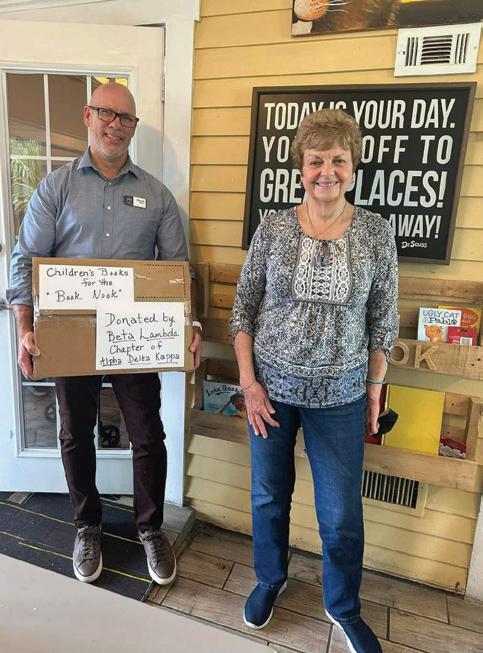
FL Beta Lambda
FL Beta Lambda Ways and Means Chair, and former librarian Nancy McClung brings books from her chapter to Pastor David at The Mission of Polk County. The chapter has provided two book racks built by a local volunteer and numerous books to assist those in need of resources to further their education and to help families develop an appreciation for fictional materials. Keeping the book racks stocked is an ongoing chapter project.
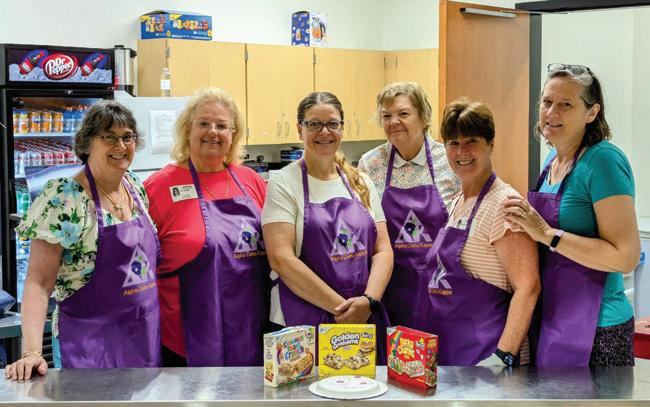
VA Beta Eta sisters staffed the concession stand at the Loudoun County Public Schools (LCPS) Summer in the Arts Program, using the proceeds to provide grants to LCPS teachers. The chapter gives three to four $500 grants each school year. The grants made it possible for the teachers to enhance their curriculum and make their instructions more engaging and accessible. Beta Eta sisters pictured are (L to R) Lisa Wieman, Dee Griffith, Denise Herrmann, Ruth Smale, Denise Higgins and Chrissie Devinney.
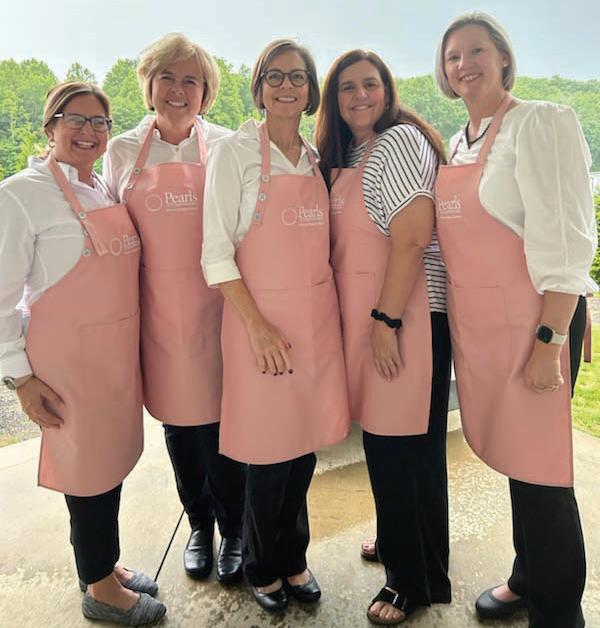
NC Beta Mu sisters (L to R) Lynn Turner, Tonya Kerr, Julie Marklin, Diane Ireland and Amanda Brooks served appetizers at the Davie Community Foundation Red Carpet Reception. The reception recognizes recipients who received scholarships and gives them the opportunity to meet the donors. Beta Mu covered the cost of the hors d’oeuvres made by students in the Davie County High School Culinary Arts and Hospitality Program.
The chapter is also a member of Pearls of Empowerment, a circle of women who work to improve the lives of women and children in Davie County. Through the chapter’s involvement with the program, the sisters say they are able to focus on supporting altruistic projects, grants and scholarships with time and resources.
OH Alpha Iota sisters recently created over 40 cards and 20 bookmarks for Cardz For Kidz. Cardz For Kidz is a donationbased organization that delivers inspiring handmade cards and bookmarks worldwide. The members brought all the supplies and sent their finished products to the organization for delivery to children, families, seniors and veterans in hospitals, schools, senior living and rehabilitation centers.
Erika McKee and Brittany Fenderson of OH Alpha Iota (L to R) display their Cards for Kidz.
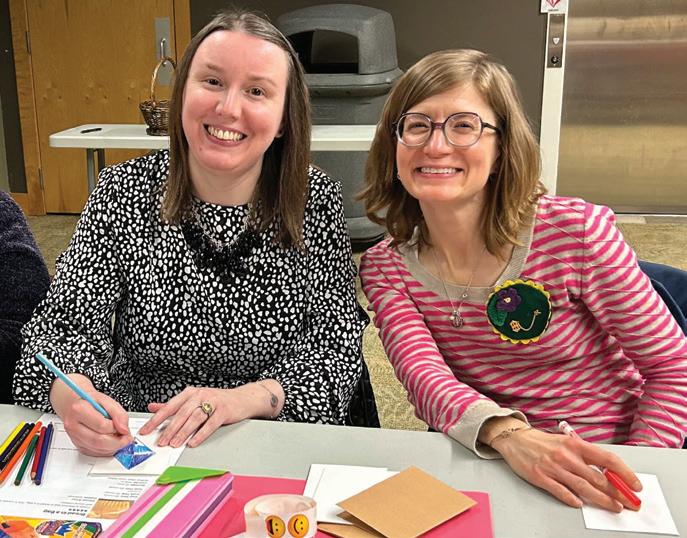
VA Alpha Rho recently donated 275 bags of “Books for Babies” to the Labor and Delivery Department of Winchester Medical Center. Each bag, intended for a newborn, contained a board book and information on developing language and reading skills during the crucial preschool years and providing a solid foundation of literacy every child needs.
The books were purchased with a donation from VA Alpha Rho member MJ Williams. The Youth Services Department Head of The Handley Regional Library System donated the bags and informational flyers and members of VA Alpha Rho prepared the bags for delivery.
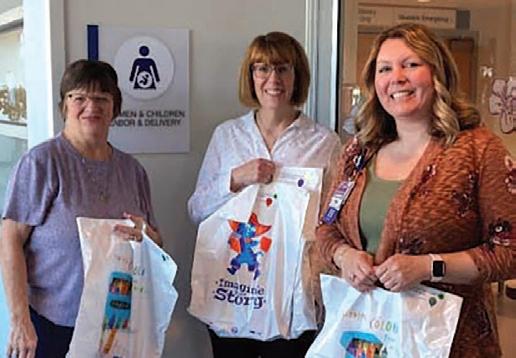
Vickie Orndorff and Kathy Yereb of VA Alpha Rho present “Books for Babies” to Rebecca Swink at Winchester Medical Center.
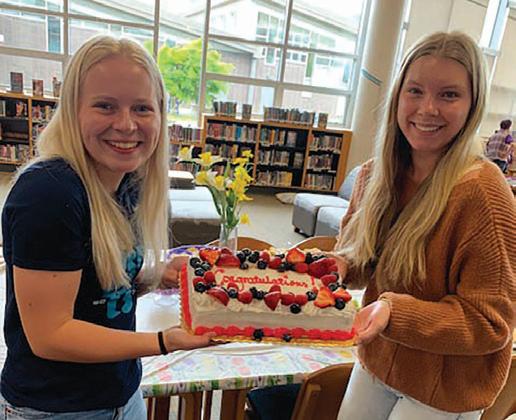
Future teachers Darci Dalziel and Ava MGinnes share a celebratory cake after being awarded $1,000 scholarships by WA Alpha Delta members.
MO Beta Xi capped off another successful year by awarding $2,500 in scholarships to three graduating seniors in the Rockwood School District in St. Louis. Each of the three will pursue a college degree in education. Members celebrated the recipients at their Annual Scholarship Luncheon, which featured a tea party theme.

VA Beta Beta collected $445 in dollar bills with an A, D or K in the serial number and donated it to their local Dolly Parton Imagination Library. According to VA Beta Beta Chapter CoPresident Annette Wauchop, collecting the dollars is a yearly project. Addilyn Kay Summers, great-granddaughter of VA Beta Beta member Marilyn Thompson reads one of the donated books.
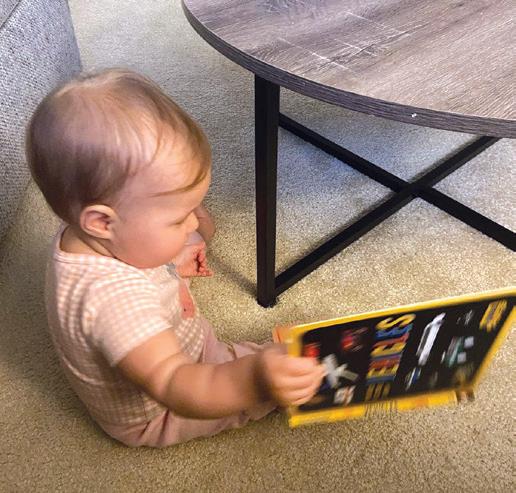
continued.
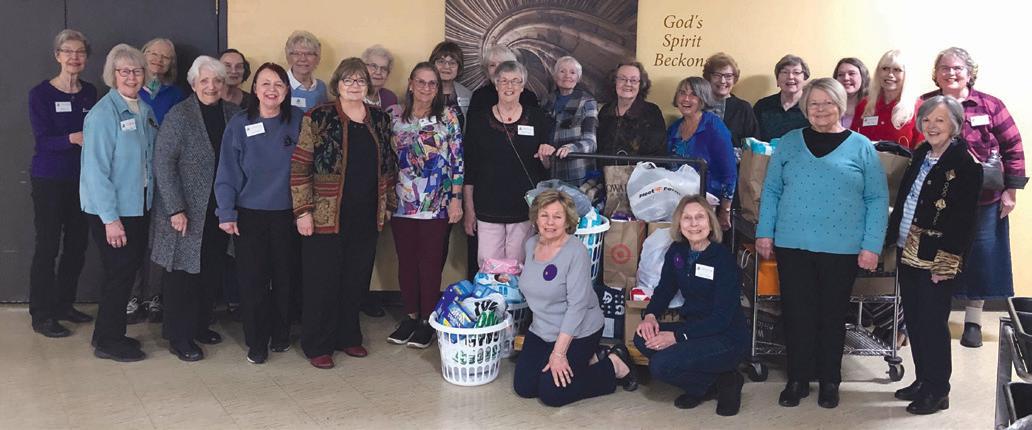
MN Alpha Alpha
MN Alpha Alpha members display their donations to the Jeremiah Project in St. Paul, MN. Karla Benson-Rutten from the Project spoke at a chapter meeting about how the Project supports single mothers enrolled in college by providing career support, quality childhood education and leadership and career training along with a supportive community. Sisters donated all kinds of necessities for the families, according to Alpha Alpha Membership Chair Sharon Copt.
By Debbie Boudin
I know you are wondering why “a marigold” since Alpha Delta Kappa is made up of sisters who are violets. Marigolds are often linked to the powerful strength of the sun and represent the power, strength and light that lives inside a person. They also provide protection to plants around them. Now doesn’t that sound just like a teacher? Here’s the story of LA Alpha Alpha and marigolds.
“Be a Marigold” was the theme of the end-of-year cording ceremony for graduating University of Louisiana at Lafayette (UL) seniors of education who belonged to the university’s chapter of Educators Rising. Our Louisiana Alpha Alpha chapter began to collaborate with UL’s Educators Rising (ER) chapter in the fall of 2022. Educators Rising is led by Aimee Barber, Ph.D., an education professor, advisor at UL, and a former first-grade teacher. LA Alpha Alpha President-Elect Pat Mouton and I represented Alpha Alpha at the cording ceremony. We were able to participate in this most wonderful end-of-year program and witness the cording of thirteen graduating seniors. During the ceremony at Educators Rising’s last meeting of the year, the 13 graduates were draped with a white cord while their college highlights and future aspirations were read as they walked on stage.
Let me tell you how our journey began with Dr. Barber and Educators Rising. One evening, Pat Mouton saw a newscast highlighting a college organization called Educators Rising. It was a light bulb moment. We found that Educators Rising’s values parallel those of Alpha Delta Kappa. ER has chapters not only in colleges but also in high schools where students take pre-education pathway courses that help make an easy transition into college and into the Educators Rising college chapter.
Louisiana has seen a large number of teacher vacancies in the past several years, leaving many classrooms without certified teachers. Unfortunately, Lafayette Parish has not been spared this shortage, but this new grant-funded program is aiming to find the teachers of tomorrow in their classrooms today. Cy Dugas is the coordinator of the Lafayette Parish School Board Pre-Educator Program. The program is funded through the state’s Reimagine School Systems grant initiative program from the Louisiana Department of Education and was implemented during the 2021-2022 school year. The high school Pre-Educator Pathway Program started with
no pre-educator courses and now has four courses serving about 49 students. UL Educators Rising started in 2021-22 with three college students and no graduates. We were very proud to have witnessed thirteen 2024 graduating seniors at the cording ceremony. What a wonderful way to help prospective teachers and keep them “home grown.” It would also be a perfect way to bridge UL’s education graduates into Alpha Delta Kappa and help continue nurturing new teachers.
Armed with this information, we brought our discoveries back to our chapter, and our members were more than willing to help. Alpha Alpha began its collaboration with UL’s Educators Rising in the fall of 2022, and it has been a perfect match. Alpha Alpha’s support of ER includes adopting an ER chapter member and paying her dues, honoring graduates with scholarships, collecting and donating classroom supplies, presenting each graduate with a copy of “Smart Art for the Busy Teacher,” attending ER meetings and giving motivational presentations. Future plans include helping with the statewide Educators Rising conference and “Teach Out Loud,” a conference for teachers created by teachers.
So, Alpha Delta Kappa sisters, if your chapter is looking for a way to add membership or you are looking for an altruistic cause, this wonderful program is definitely worth exploring.
ED note: Debbie is the author of “Smart Art for the Busy Teacher” under Scallan. She is a member of LA Alpha Alpha.
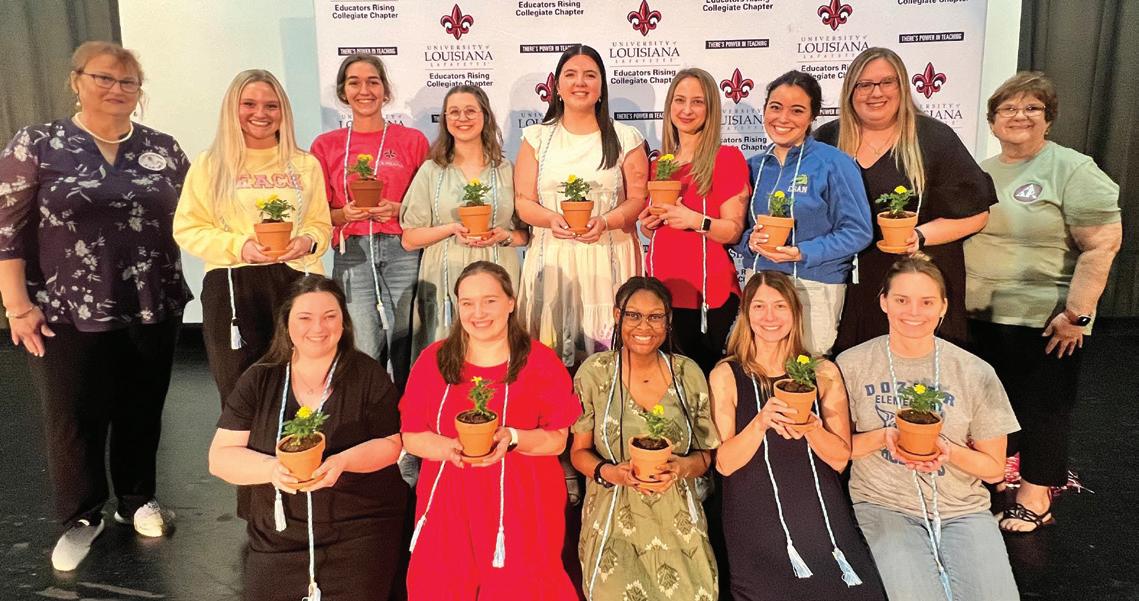
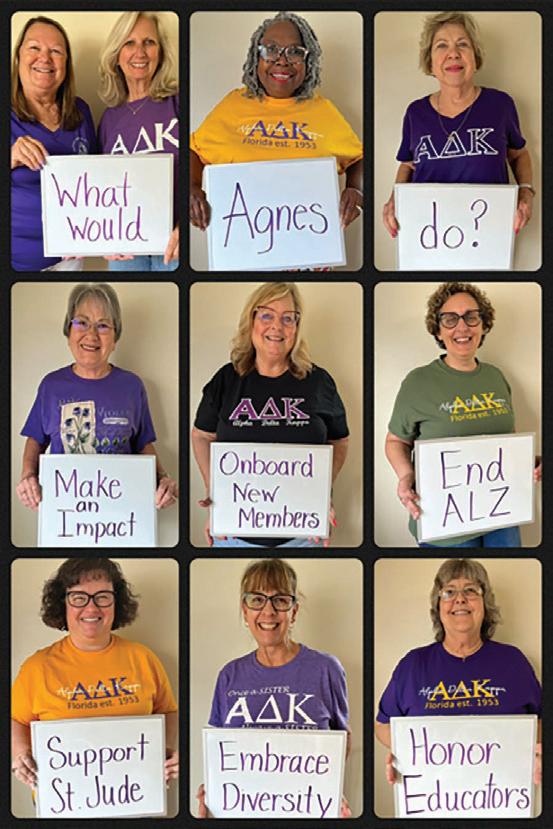
The FL Executive Board created this photograph at its retreat to remind sisters of the importance of Alpha Delta Kappa. FL President Caroline Gilmore says, “This is a reminder of who we are and what we do as an organization.”
The Board held its retreat at the Southern Scholarship Foundation House at Florida State University. FL State officers pictured are (First row, L to R) Audrey Reali, Caroline Gilmore, Jackie Jackson and Mary Roach. (Second row L to R) Debbie King, Paula Byrd, and Liz Lilly. (Third row L to R) Missy Decker, Denise Fenicle and Debbie Garrison.
One of the extra special activities of FL Gamma Tau chapter was a tea party at the Sweet Tea Café in Deland, FL.
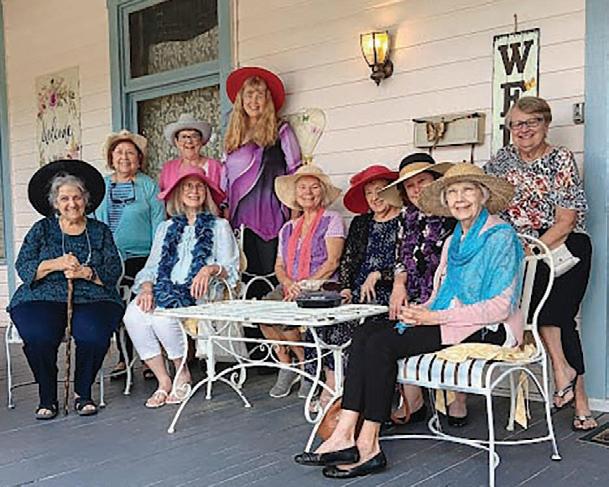
Pictured (Back row L to R) are Nora Simons, Barbara Reddish, Meg Fisher and Helen Lanza. (Front row L to R) are Carmen Visconti, Roberta Montgomery, Betsy Baer, Sue Thurmond, Marilyn Treusch and Linda Raup. The chapter also made donations to three neighborhood schools and a local homeless shelter.
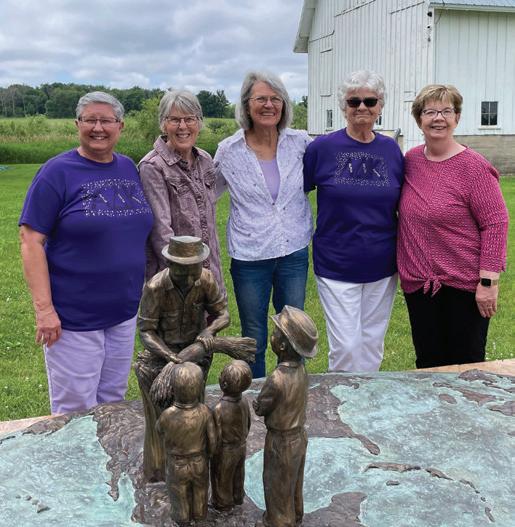
The IA Phi sisters traveled to Norman Borlaug’s boyhood home. In 1970, Borlaug was awarded the Nobel Peace Prize for his development of dwarf wheat and the elimination of the rust fungus. Borlaug is credited with saving over a billion people from starvation. In 1986, he established the World Food Prize and Youth Institutes to further agricultural research. Past IA State President Linda Becker, Phi President Marilyn Buttjer and Past Phi Presidents Judith Mulcahy and Julie DeBower are pictured with the statue of Borlaug and his farm workers. Phi Historian Susan Jacob says the Phi sisters are lifelong learners.


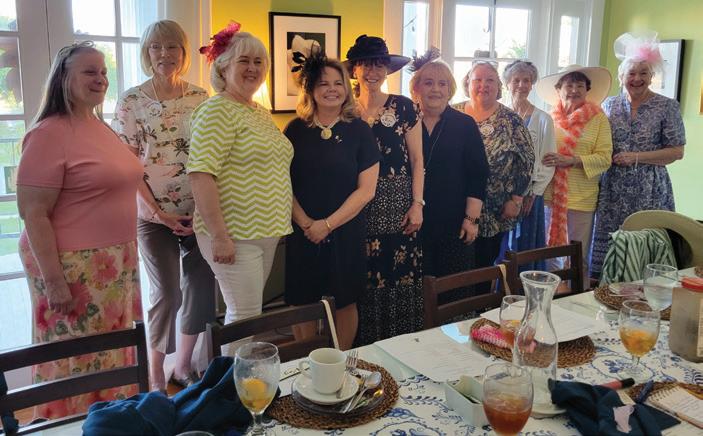
LA Delta’s new officers had a good time dressing up in boas, hats, fascinators, flowers and special jewelry for the Southern Faire Installation Dinner. LA State President Angie McEachern installed the officers. Chapter President Debbie Blanchette gave each executive officer and committee chair who served during her biennium an A∆K bookmark inscribed with their name and date of initiation.
The Food Bank of Northwest LA Backpack Project was the chapter’s altruistic project for May. Members donated over $300 to help provide kid-friendly food items for weekend meals.
All smiles following the installation are (L to R) Treasurer Penny Kulp, Secretary Mona Bartage, LA State President Angie McEachern, Chapter President Sheryl Thomas, Past Chapter President Debbie Blanchette, Chapter President-Elect Karen Merritt, Historian Melissa Elrod, Corresponding Secretary Cynthia McCord and Co-Chaplains Mary Agnes Rambin and Kay Robinson.

Eric Talerico, a fraud investigator, and Sergeant Megan Kimball of the Union County Sheriff’s Department, gave tips to avoid fraud and scams at a recent community safety program hosted by NC Pi. Donations made at the event will be used for the chapter’s yearly scholarship. Kimball is shown giving the audience examples of how scammers work.
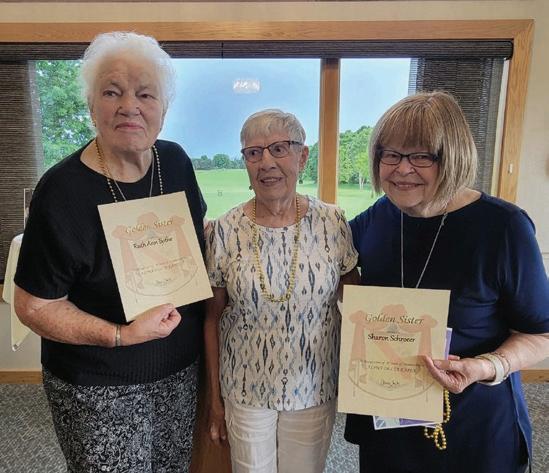
MN Alpha Rho Golden sisters Ruth Ann Bothe (left) and Sharon Schroeer (right) show their certificates to Sapphire sister Marge Ihrke at the chapter’s fiftieth-anniversary celebration. The luncheon was attended by the MN state president and three of the chapter founders. The afternoon included an Omega service for two sisters, the awarding of the yearly scholarship and the recognition of the new Golden sisters.


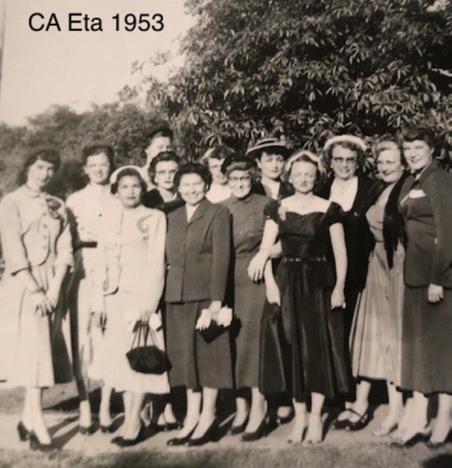
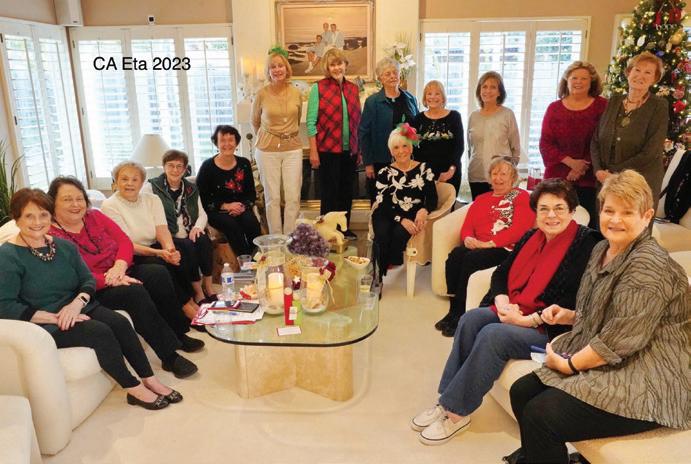
“As I looked back at the scrapbooks from 1953 forward, I could see that the goals of our sorority have remained strong over the years. The bonds that come with being a part of the educational community only enhanced our friendships. Sisterhood, altruistic endeavors and being part of a larger organization enrich our lives as much today as they did for our sisters in 1953. Although 70 years have passed since our chartering on September 19, 1953, nothing really has changed…except for styles of dress,” said CA Eta President Barbara Campbell, commenting on the San Diego chapter’s seventieth anniversary. Photos from the chapter’s scrapbooks show that fashions have changed but sisterhood remains the same.
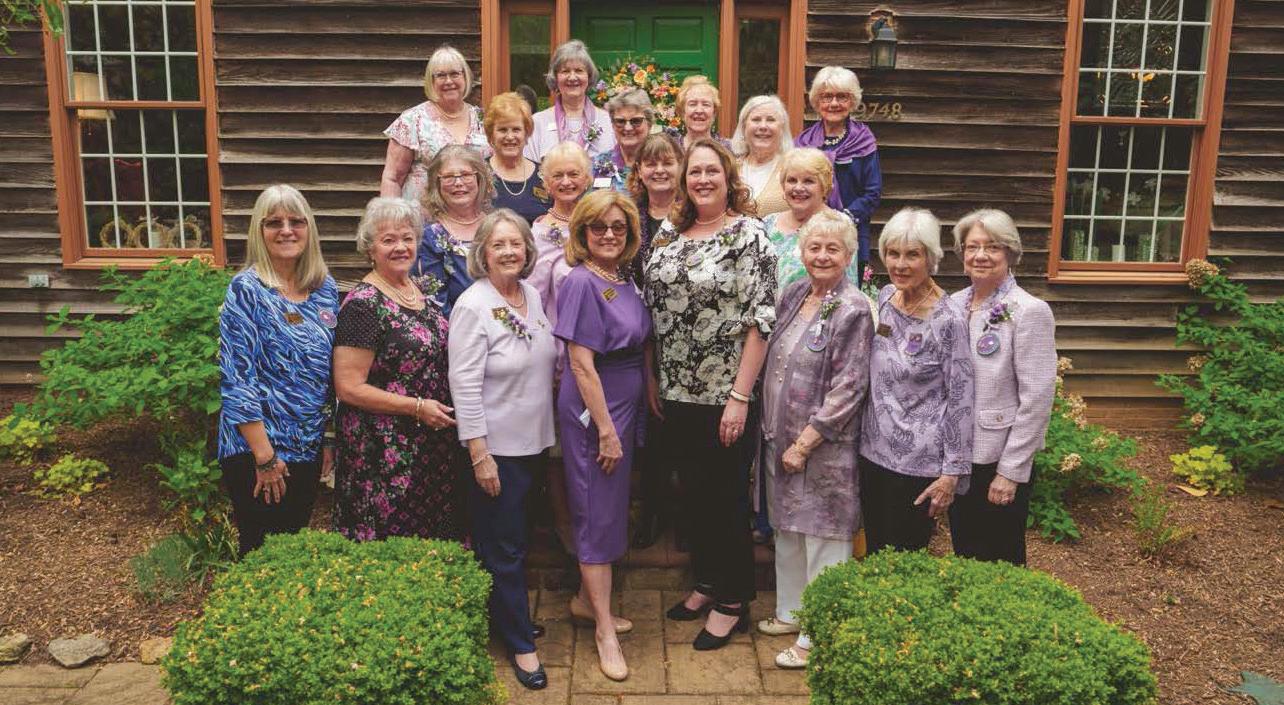
VA Tau members are all smiles as they celebrate the chapter’s Diamond Anniversary. (L to R) Front Row: Sue Ann Hilten, Teresa Lusby, Sue Saccamando, Patti Hickman, Leslie La Croix, Lorraine Cocolis, Sara Ann Bounds, Mary Sue Cullen. Second Row: Cindy Venne, Judy Tate, Sue Cordek, Cheri Harte. Third Row: Peggy Curley, Anne Brooks, Karen Fosler. Fourth Row: Marilynn Zook, Jane Alger, Barb McClellan, Marilyn Whiteside. Guests donated diverse children’s books to be given to new teachers at the beginning of the school year. The celebration honored current and past state, regional and International officers, remembered past altruistic endeavors and included historical tributes from past chapter presidents. The afternoon concluded with the initiation of a new member, Erin Geiger.
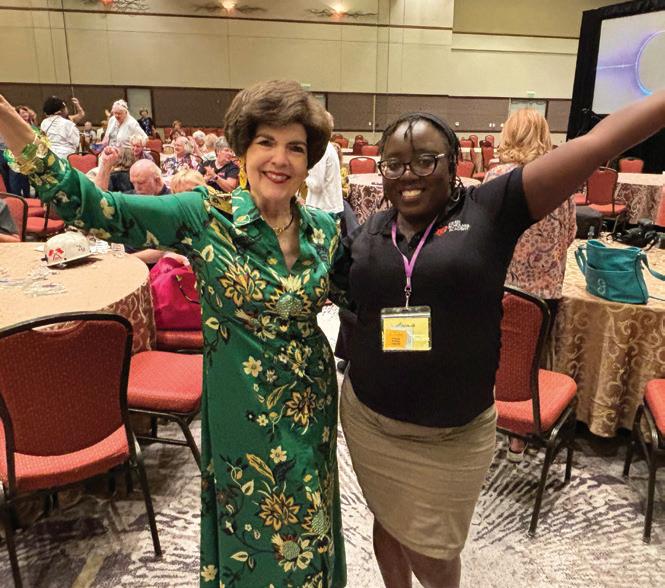
Student Sharonda Hannah Jacobs, SC Chi, (R) and her second-grade teacher, Flo Johnson, SC Fidelis Zeta, dance as they celebrate their reunion as A∆K sisters. Sharonda says she didn’t think that after 35 years, her teacher would remember her, but Flo said she never forgets a face. The pair found each other at a district meeting.
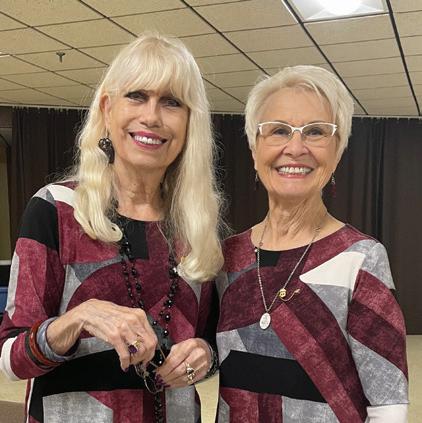
MN Alpha Alpha Co-Presidents
Kathi Treston (L) and Mary Abuan (R) carry their “twinning” leadership style, from co-sponsoring an ITE scholar, Rose Marie Rementina, to dressing alike for chapter meetings. The pair have been friends since they first started teaching in the same elementary school in the late ‘60s. They even received their master’s degrees together. Kathi and Mary decided to dress alike to set a tone of fun for the chapter meetings. They enjoy seeing the reactions when their sisters realize they are dressed alike. The chapter began using a co-president leadership style in 1998 and there have been only three individual presidents since that time. The twosome highly recommends “twinning” because, as they say, “You will always have another pair of hands and eyes and two hearts to help you do your best.”


My husband and I called “Sophie” our third daughter. Unfortunately, we lost her back in January, and we were heartbroken. This picture was taken at Christmas 2020 and symbolizes the joy that we had for her in the 15 years that she was with us.
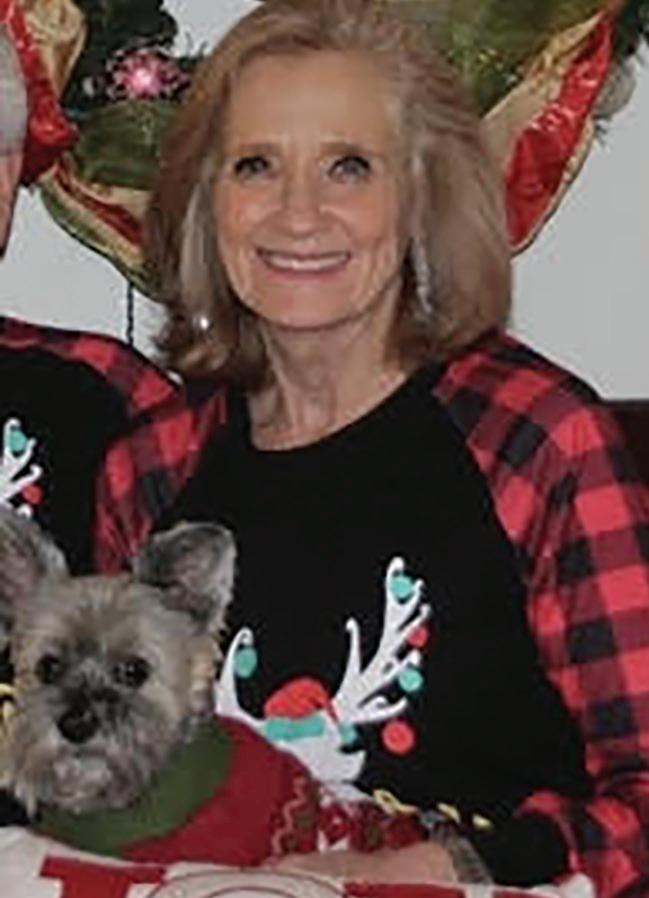
Wanda F. Wallingsford .................................
MEMBERS ADDED SINCE LAST ISSUE
Alabama Alpha Phi
Lois P. Gilmore..................................................
Alabama Kappa
Mauvalynn Felts ................................................... Arizona Theta
Mary Button
Kathey A. Roberts
Joan McKenna
Susan E. Benson
Mary Ann A. Rozsas
Janet C. Amos
Ruby Kenaston
Arkansas Alpha Delta
Arkansas Alpha Epsilon
California Beta Xi
Colorado Psi
Delaware Eta
Florida Delta Chi
Florida Fidelis Tau
Ann C. Oakley ..............................................
Mimi A. Jones ............................................
Sharon Rorex .............................................
Florene Hendrix
Ruthann Butscher
Frances D. Giles
Ernestine Lee
Carolyn T. Mizuno
Mary A. Murakami
Mary C. Hahn
Mary Jane Baker
Florida Fidelis Zeta
Florida Gamma Zeta
Georgia Alpha Delta
Georgia Alpha Gamma
Georgia Alpha Sigma
Georgia Alpha Sigma
Georgia Fidelis Xi
Hawaii Delta
Hawaii Sustaining
Illinois Lambda
Indiana Alpha Beta
Rebecca L. Miller ............................................
Indiana Alpha Psi
Patsy K. Baker.................................................
Indiana Omicron
Marsha Eppert .......................................................
Charlotte M. Comer
Carol Hood
Shirley Cahalen
Davalene M. Burch
Virginia L. Pratt
Lynda Nakamoto
Carol T. Dickinson
Iowa Epsilon
Iowa Iota
Iowa Nu
Kansas Upsilon
Kentucky Theta
Kentucky Upsilon
Louisiana Alpha Xi
Maryland Epsilon
Joanne S. Rowe ...................................................
Maryland Eta
Edith M. Shea ............................................ Massachusetts Beta
Sandra L. Coveart ..................................
Kay L. Frahm
Doris H. Sharlow
Eleanor M. Palmer
Michigan Alpha Kappa
Michigan Alpha Sigma
Michigan Phi
Minnesota Alpha Alpha
Carol Szymczak......................................... Minnesota Alpha Phi
Maxine Thoreson Minnesota Delta
Evelyn Johnson Minnesota Pi
Kay Clarke Nebraska Nu
Yvonne D. Swain .....................................................Nevada Eta
Victorine F. Brooks New Jersey Psi
Joyce Davies New Mexico Eta
Janice Monnat .......................................... New York Alpha Beta
Linda W. Harris North Carolina Alpha Gamma
Judy P. Vestal North Carolina Alpha Omicron
Pansy R. Rumley North Carolina Alpha Psi
Linda T. Denmark ................................. North Carolina Beta Phi
Mary A. Cathey North Carolina Sustaining
Gladys C. Williston Ohio Phi
Deborah A. Berchtold Oregon Rho
Zoraida Castellon.............................. Puerto Rico Alpha Epsilon
Julia A. Tirres Tennessee Mu
Margaret E. Martin Tennessee Rho
Louise Sams................................................... Tennessee Theta
Mika K. Malone
Texas Beta Iota
Rena M. Woody Texas Delta Alpha
Becky A. St. Nicholasy Texas Delta Epsilon
Donna Holcomb ........................................ Texas Delta Lambda
Carol W. Molloy Texas Gamma Pi
Nancy M. Phipps Texas Gamma Psi
Virginia Emmott Texas Omicron
Frances M. Owen ...............................................Texas Omicron
JoAnn B. Taylor Utah Sustaining
Yvonne C. Rogers Virginia Beta Kappa
Lisa J. Setzer ........................................... Virginia Beta Omicron
Karen Guthrie-Mehlert Washington Gamma
Jerry DeFilippo
Ruth W. Ruf
West Virginia Fidelis Gamma
West Virginia Pi
Kathryn M. Stoops............................................. West Virginia Pi
Sheryl M. Fanning
Wyoming Delta
By Joanne Grimm, Past California State Chaplain, Past Southwest Region Chaplain, CA Alpha Alpha.
One of the saddest and most difficult words in any language is “goodbye.” The Greek word “omega” means the end, the last, the final. In Alpha Delta Kappa, we say farewell in the memorial service we call Omega.
The chaplain is responsible for planning and leading the service, whether at a chapter meeting or convention. What goes into that planning?
The Omega ceremony is an opportunity to honor sisters, thank them for their years of service, and remember them. The service needs to reflect the diversity of the members.
Before planning begins, it is important to know the budget for the service. Funds are needed to cover program printing and other items.
The first step is to compile the list of sisters to be honored. These are sisters who joined the Omega chapter after the last service and those who may have been missed earlier. Names can be found in the KAPPAN or from records at Headquarters. Verify the names with the chapters to ensure that the information is correct. Determine and announce the cut-off date for finalizing the program for the ceremony. Sisters who join Omega after that date may be named in the ceremony if you wish.
In general, members who have held office at the International, State, Province or Nation level receive special mention in the ceremony and the program.
Choose a theme and a color scheme for the service. The biennium theme is one option. Themes developed around nature and candlelight are popular. To create the backdrop for the service, choose similar colors for flowers, program covers, candles, or table coverings.
Poems and music can be found under the Google search “secular poems and secular music for ceremonies.” “Imitation of Immortality” by William Wordsworth, “She is Gone” by David Harkins, and “Gone From My Sight” by Henry Van Dyke are examples of appropriate poems. Songs such as “Bridge Over Troubled Waters,” “Let It Be,” “Celebrate Me Home,” “My Heart Will Go On,” “Wind Beneath My Wings,” and “Morning Has Broken” are also appropriate.
Vocal or instrumental pieces by sisters are always a nice addition to the program.
Some practical aspects that must be considered are the location and capacity of the venue and the number of sisters to
be remembered. The room size determines the seating arrangement and the location of tables, flowers, musicians, and the participants. The length of the service depends upon the program and the number of sisters being honored. A good time estimate is between 30 and 60 minutes.
The chaplain may conduct the entire service or ask others to participate. If time is given for individual remembrances, give a time limit to the speakers and have a plan for politely reminding speakers of it. Keep in mind that computers, microphones and other electronic devices can suddenly just quit. Have a Plan B in case this happens.
Lighting a candle for each new Omega member as the poem “Four Candles” is read is a favorite ceremony. Batteryoperated candles will serve if the venue does not permit lit candles. A flower theme with flowers given to the chapter or family members of the Omega sister after the ceremony is often used. Flowers from the gardens of members add a special touch.
The printed program is a remembrance for sisters and family members. It includes the order of the program and the names and chapters of the Omega sisters. Identify a sister by her name as listed in the records at Headquarters with any nickname in parentheses.
Hold a rehearsal or a meeting to go over the program and make certain that every sister knows her part. Give the participants information about what to wear, sit and arrive.
Chapter Omega memorials may be a donation or an activity or a sharing of stories. Some chapters donate plants to schools or parks while other chapters donate books with a bookplate that include the Omega sister’s name to schools or libraries. Participating in the member’s favorite activity such as a walk or a visit to a museum or crafting are other ways to honor a member. Giving a scholarship in the name of the sister is another way. One chapter toasted a member with her favorite beverage and remembered the first time they had met her.
A suggested service can be found on the International website in the Resource Library under Memorial Service Information.
There is not one way to honor and remember a sister. Author Dr. Seuss said, “Remember me and smile, for it’s better to forget than to remember me and cry.”
September 2 ................................................ HQ closed – Labor Day
................................... Alpha Delta Kappa Month
Oct 1 KAPPAN submissions deadline (December publication)
Oct 1 World Understanding project Application – deadline
Oct 1 Chapter Yearbook to S/P/N President
Oct 1 ............International Officer Candidate application - deadline
Oct 1 .................................... Classroom Grant Application deadline
Oct 15 ........... Proposals for International Bylaws Amendments and Resolutions – deadline (JotForm)
Oct 15 International Altruistic Project proposals for next biennium – deadline (JotForm)
Oct 15 ...... S/P/N Bylaws or S/P/N Official Policy Statement to the International Bylaws Chairman deadline
Oct 15 .................................................... 990-N E-Postcard deadline
Oct 15 Leadership Academy applications for participants and mentors deadline
Oct 15 Regional Mini Fall Scholarship application deadline
Oct 15 ......... Chapter Needs Assessment (CNA) deadline (JotForm)
Nov 15 Innovation Grant deadline
Nov 15 .........................S/P/N Needs Assessment (Biennium Goals) deadline (JotForm)
Nov 15 ................ S/P/N VPM/MC send CNA reflection to RVPM – no form to submit
Nov 15 ......................... Educational Symposium Proposals deadline
Nov 21-22 ......................................................HQ Closed – Holiday
Dec 23-31 ............................................. HQ closed for winter break
Compiled by Sandy Wolfe, A∆K Foundation Chairman
Again this year, the Alpha Delta Kappa Global Team surpassed its goal for the Alzheimer’s Association’s Longest Day campaign. In mid-July, the total donations were $ 274,909.48 raised by 98 teams and 347 participants. The goal was $250,000. The last day to report donations was August 31.
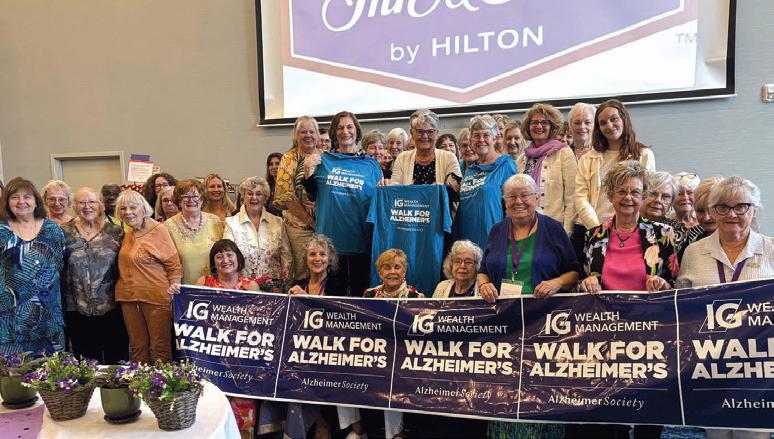
The IG Wealth Management Walk for Alzheimer’s, held yearly in May, is Canada’s largest fundraiser for dementia awareness. Over 650,000 Canadians currently live with dementia, a figure that is expected to climb to nearly two million by 2050. Ontario sisters took 5,036,101 steps for $6,661.50 in donations.
Ontario convention attendees pose for a group photo with (L to R) International President Ann Marie Brown, Regional President Nancy Bishop and Regional Membership Chair Ann Ainslie waving the Walk tee shirts.
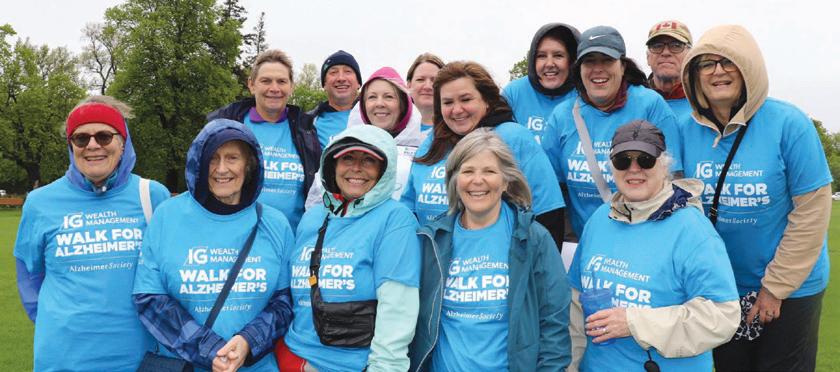
The wet weather did not dampen the spirits of the Manitoba sisters, who raised $4,679.00 in their Walk for Alzheimer’s.
Manitoba sisters set off in May on their Walk for the Cure.
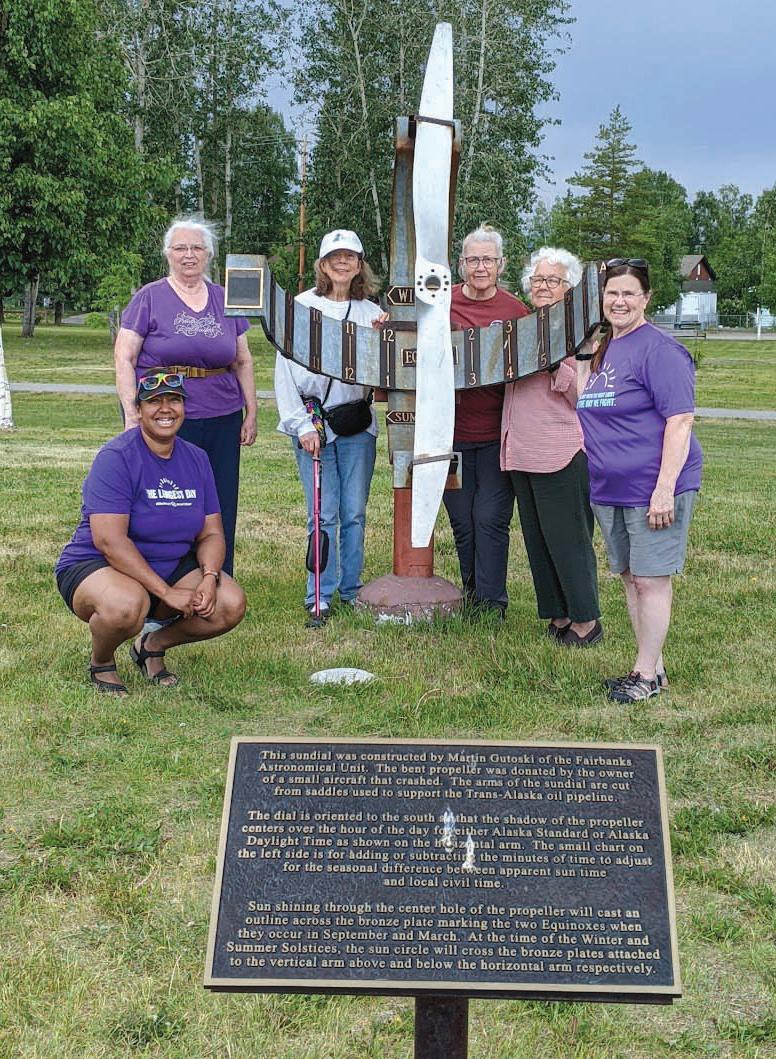
Gwen Brazier, Amanda Ross, Carolyn Gray, Teresa Hall, Judy Shiffler and Barbara Nore from Alaska’s Gamma and Zeta chapters stopped at the sundial in Weeks Field, Fairbanks after walking around the park sharing stories of loved ones as their Longest Day activity. During this event, sisters gravitate to the sundial to see the sun shine through the hole of the metal propeller, illuminating the word “summer.”
